














































Cladco Steel Roofing Sheets are incredibly versatile and stand testament to both quality and reliability. Sheets are easy to install, durable and available in custom lengths. Speak to our expert Sales team to find out more.

Polyester Paint, PVC Or Prelaq Mica Coatings
Fibre Cement Roofing Sheets Available Collection or Delivery from Andover Box Profiles, Corrugated And Tile Form Sheets
Pictured: 41/1000 Tile Form Roof Sheet
Andover Branch 55 Reith Way, Andover, Hampshire SP10 3TY
Mon-Fri 8am to 5pm, Sat 8am to 1pm
Head Office Beardown Road, Exeter Road
Industrial Estate, Okehampton, Devon EX20 1UA Mon-Fri 8am to 5pm, Sat 8am to 1pm








www.southeastfarmer.net
SOUTH EAST FARMER
Kelsey Media, The Granary, Downs Court Yalding Hill, Yalding, Maidstone, Kent, ME18 6AL 01959 541444
EDITORIAL
Editor: Malcolm Triggs
Email: sef.ed@kelsey.co.uk
Photography:
Martin Apps, Countrywide Photographic
ADVERTISING & MARKETING
Jamie McGrorty 01303 233883 jamie.mcgrorty@kelsey.co.uk
GRAPHIC DESIGN
Jo Legg 07306 482166 jo.legg@flair-design.co.uk
MANAGEMENT
DIVISIONAL MANAGING DIRECTOR: Steve Kendall
PUBLISHER: Jamie McGrorty
RETAIL DIRECTOR: Steve Brown
SUBSCRIPTION MARKETING MANAGER: Claire Aspinall
PRINT PRODUCTION MANAGER: Kelly Orriss
DISTRIBUTION
Distribution in Great Britain: Seymour Distribution Limited 2 East Poultry Avenue, London EC1A 9PT Tel: 020 7429 4000 www.seymour.co.uk
Distribution in Northern Ireland and the Republic of Ireland: Newspread Tel: +353 23 886 3850
Kelsey Media 2024 © all rights reserved. Kelsey Media is a trading name of Kelsey Publishing Ltd. Reproduction in whole or in part is forbidden except with permission in writing from the publishers. Note to contributors: articles submitted for consideration by the editor must be the original work of the author and not previously published. Where photographs are included, which are not the property of the contributor, permission to reproduce them must have been obtained from the owner of the copyright. The editor cannot guarantee a personal response to all letters and emails received. The views expressed in the magazine are not necessarily those of the Editor or the Publisher. Kelsey Publishing Ltd accepts no liability for products and services offered by third parties.
Kelsey Media takes your personal data very seriously. For more information on our privacy policy, please visit www.kelsey.co.uk/privacy-policy/
If at any point you have any queries regarding Kelsey’s data policy you can email our Data Protection Officer at dpo@kelsey.co.uk


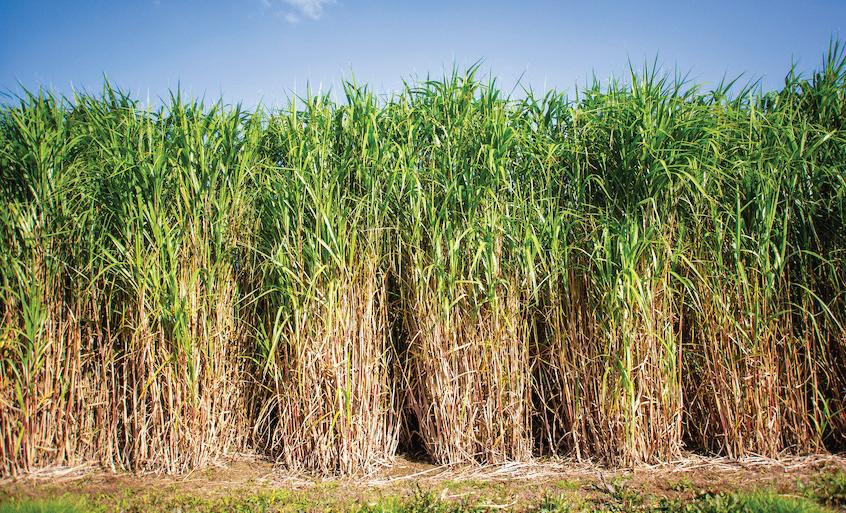

Minimising the development of wormer
–
Neither
James Seller, a fourth-generation mixed
Mike takes readers on a quick tour of Malawi to see our own agricultural history compressed over decades.
Hutchinsons has announced the launch
www.kelsey.co.uk
Cover picture: South East Forestry
It’s raining again, but I guess that with so much seemingly positive news out there this month I was due something to balance out all that optimism.
With a five-year plan for overseas workers allowing fruit growers to look more than 12 months ahead, and government ministers talking up farming at every opportunity, it really is starting to feel like spring in a philosophical sense as well as a meteorological one.
Cynics might say that positive and supportive language from a government that’s going to have to call an election in the near future and is languishing - to put it mildly - in the polls is only to be expected, but if just some of the promises made following the second Farm to Fork summit are backed up by actions then we might see some real help for the industry.
The slew of good news announcements, which included a commitment to introduce the much called-for food security index, was enough to put a smile on the face of the grumpiest grower, but the proof of the (apple) pudding will of course be in the eating.
On the face of it, though, support for everything from mobile abattoirs to wet weather payments via precision breeding grants, affordable renewable energy and less planning red tape must surely be a good thing.
Like all good things, though, these cherries will need picking. Leave them on the tree and they will wither, or at best be eaten by all those wild birds for which farmers are being encouraged to provide food as we balance support for nature with feeding the nation.
So, my advice (usual caveats and disclaimers apply) would be to take the opportunity and don’t assume that the millions of pounds worth of grants for innovation and technology are aimed at other people; in short, don’t just lament the longterm plan to cut the amount of seasonal labour we import from overseas and carry on making the most of it for the next five years.
Because those five years will end, and growers and farmers who haven’t invested in automation in the meantime will find themselves at a disadvantage that even the most bells and whistles-equipped food security index won’t help. That’s just a pretty document – it’s the cash on offer that farmers and growers need to be bidding for. Once it’s stopped raining, anyway…

 MALCOLM TRIGGS - EDITOR
MALCOLM TRIGGS - EDITOR
EMAIL YOUR VIEWS, LETTERS OR OPINIONS TO: sef.ed@kelsey.co.uk or write to the address on page 3





A five year extension of the seasonal worker visa route, funding for packhouse automation and moves to promote opportunities in the agri-food industry to domestic job seekers have been well received by the industry.
British Apples & Pears Ltd was quick to welcome the announcement (see letter, Page 11), which followed the independent review into labour shortages in the food supply chain published by the expert panel led by John Shropshire.
The independent review looked closely at the extent of, and reasons for, labour shortages, and made ten recommendations dealing with recruitment and retention, skills and automation.
DEFRA Secretary of State Steve Barclay pointed out: “Our food supply chain contributes over £128 billion to the UK economy every year, provides employment for over four million people and puts high quality, homegrown food on our plates.
On investment in automation, he said: “We have a huge opportunity before us to modernise the food supply chain through automation, unlocking higher skilled, more attractive jobs for British workers while also improving productivity, product quality and capacity.
“To capitalise on this, we will increase support for agri-innovation by up to £50 million by launching an ambitious programme to automate packhouses in horticulture. We will also fast-track research and development of robotic crop harvesters, building on the exciting innovation already emerging within the sector.”
But in recognition of the fact that “the full benefits of automation will not be realised overnight”, he said the Government would extend the seasonal worker visa route from 2025 to 2029 “to give the sector the certainty they need to plan for their businesses”.

At the same time, he warned: “We are clear that visa allocations must fall as the benefits materialise, and we will work with the sector to ensure this happens as quickly as possible.”
The review suggested that the recruitment and retention challenges facing the agri-food supply chain should be tackled by raising awareness of opportunities and by more investment in career development and training.
There will be 43,000 visas available to the horticulture sector in 2025, plus another 2,000 for poultry. The Government believes the small reduction this represents “is appropriate given the uptake of visas in 2023 and 2024, the anticipated effect of productivity improvements and the need to signal a serious direction of travel alongside our automation challenge”.





A vintage tractor run featuring more than 250 vehicles from as far afield as Scotland, Wales and Cornwall raised an impressive £21,235 for charity.
The 2024 National Vintage Tractor Road Run, held in East Sussex for the first time and organised by the South Eastern Vintage Agricultural Club (SEVAC), followed a challenging circular route across the South Downs.
Starting at Plumpton College, the route included on-road and off-road elements, with a few of the vintage machines forced to turn back at the first hill. Most of the 256 starters, though, completed the picturesque Easter Sunday journey.
The cash raised will support Patchwork Farm, a therapeutic care farm designed to give young people at Chailey Heritage Foundation, north of Lewes, a unique, hands-on, multi-sensory experience with a number of different animals.

Event co-chair Will Cranfield said SEVAC had been excited to host the event, which had not been held in this part of the country for “a good few years”. He added: “It was certainly a rewarding challenge and a fantastic opportunity to show the public and the wider vintage tractor community what SEVAC and Sussex have to offer, while also raising money








for such a worthy cause."
The run was led by Cameron Kemp on his Nuffield Universal 3, flanked on one side by mum Marian on her Fordson Major E1A and on the other by Dad Bryn on his McCormick International B450.

The smallest tractor in the run was a Zetor MT8 and the largest a Case MX135. The furthest travelled came from near Glasgow in Stirlingshire, while there were seven others from across Scotland and entrants from

Cornwall, the Isle of Wight and Wales. Will Folkes, director of specialist services and income at Chailey Heritage Foundation, thanked SEVAC and those who took part for “this fantastic donation”. He said the cash would “help Patchwork Farm deliver a wide range of benefits for months to come”, adding: “The SEVAC team put literally years of effort into what was a brilliant weekend, and we are incredibly grateful for their invaluable support.”



While government initiatives to support farming following this year’s Farm to Fork Summit in Downing Street have been welcomed by the industry, the NFU has warned that it may be “too little too late” for some.
NFU President Tom Bradshaw said many of the announcements, which included a commitment to a long-awaited food security index, were “extremely welcome”, but said the crisis in farming was so severe “that some farmers and growers believe they may not survive long enough to benefit from today’s announcements”.
He said the NFU had been particularly pleased to see progress on long-term strategic ambitions around the food security index and measures to boost the production of more British fruit and vegetables, adding: “We are pleased that the Government has taken on board our calls for a bigger and more accessible replacement for the EU Fruit and Veg Aid Scheme, and a commitment to legislate to improve contractual relationships.”
But he went on: “We cannot forget that
our members have experienced the wettest eighteen months since 1836, including devastating flooding, and many are facing an acute short-term crisis."
Pointing out: “The NFU’s recent confidence survey revealed just how tough it is out there currently”, Mr Bradshaw said the union wanted to see “core standards for food imports” included in the Government’s longterm plan for agriculture.
Alongside the food security index, the Government announcements included a new blueprint to increase domestic production in the UK horticulture sector and further support for farmers and growers affected by wet weather.
The Government has agreed to maintain the annual farming budget at £2.4 billion and introduced a £427 million grant package to foster innovation and productivity as well as expanding the seasonal worker visa route to help growers recruit the workers they need.
Up to £30 million will be allocated for precision breeding technologies to enhance crop yields and resilience and there will be additional funding to help farmers adopt
renewable energy solutions to promote sustainability and reduce farming’s carbon footprint.
The package of measures, unveiled by Prime Minister Rishi Sunak, included a blueprint setting out how industry and government can work together to increase domestic production and drive investment into a sector already worth more than £4 billion to the UK economy.
The plan includes ensuring the sector has access to affordable and sustainable energy and water, cutting planning red tape to make it easier and quicker to build glasshouses, and boosting innovation. The announcement said DEFRA was looking to double to £80 million the amount of funding given to horticulture businesses through the EU legacy Fruit and Vegetable Aid Scheme which will be replaced from 2026.
The Prime Minister also outlined further support for farmers affected by this winter’s wet weather and said there would be £75 million to help internal drainage boards recover from the winter storms and
modernise and upgrade assets that support resilience for farms and rural communities.
The Government also announced £3 million to support new and mobile abattoirs through the Farming Investment Fund, building on the Small Abattoir Fund which opened last year.
Environment Secretary Steve Barclay, who said food security was “vital to our national security”, commented: “Today’s announcements will turbocharge the growth of our horticultural sector, supporting the building of cutting-edge glasshouses and innovative farming techniques to put British fruit and vegetables on our plates all-year round.”
Farming Minister Mark Spencer, meanwhile, promised that the Government would “always back British farmers” and confirmed: “Food production is the primary purpose of farming, and our farmers and food producers work hard to keep the nation fed, despite challenges including flooding.”
Tom Bradshaw was quick to pick up on the goodwill messages, pointing out: “While we are pleased to see the Prime Minister and DEFRA saying UK food security is vital to our national security, we need actions in the short-
term that underpin that statement, in order to rebuild confidence and resilience so farming businesses can continue producing food.”
Chair of the Environment, Food and Rural Affairs Select Committee Sir Robert Goodwill welcomed the summit, claiming it presented “a significant opportunity to tackle the serious issues facing farmers and the food supply chain” and adding: “The farming sector works tirelessly to feed the nation and protect its natural environment.”
Sir Robert also welcomed Government plans to appoint a tenant farming commissioner “who will provide a strong voice for tenant farmers throughout the country”, pointing out: “Tenant farmers form an essential part of our farming communities, and it is essential that their rights are protected and respected.”
The summit was also welcomed by the Country Land and Business Association (CLA), whose President Victoria Vyvyan called on the Government to “go a step further by developing a robust and bold plan for the rural economy as a whole”.

Also joining the queue to be upbeat was
The Fresh Produce Consortium (FPC), which said it was “positive about the opportunity to enhance UK fresh produce production and food security” and added that the initiative “reinforces the need for a balance of imports to meet the diverse eating habits of our nation”.
Executive chair of BAPL Ali Capper said top fruit growers would be “absolutely delighted” with the announcement and “especially heartened by the announcement of up to £10m for English orchard growers to access equipment, technology and infrastructure”.
She added: “The future of British orchards and the growth of British apple and pear volumes is definitely looking brighter today.”
Soil Association Certification chief executive Dominic Robinson represented organic and nature-friendly farmers at the summit and championed the vital role of wildlife and soils in delivering food security.
Calling for “more, long-term support for farmers to shift to resilient practices”, he said: “The Government’s push to back British farmers is welcome – they must now back British wildlife and healthy diets to deliver a sustainable, secure food system in the UK.”

Do you need...
› A new building?
› To build a noise bund?
› To create a hardstanding to store silage or straw?
› To build up an area to prevent flooding
› To fill in an old lagoon?
We can subsidise your costs by building up areas with subsoils classed as non-hazardous inert waste.

We can gain all planning permissions needed so give us an opportunity to reduce some or all of your costs on your next project or improvement. East Sussex area preferred.



If you or someone you know is looking to study agriculture at university, starting this September, you could benefit from £5,000 a year in funding.
Spence Agricultural Scholarships are open to applications from Year 13 students intending to study for a BSc Hons in relevant subjects, in England or Wales.
Supporting agricultural education www.rbt.org.uk/grants/spence-agricultural-scholarship

Farming leaders are calling for rural crime to be a priority following the Police and Crime Commissioner (PCC) elections earlier this month and have pointed out that with many farm businesses also home for farmers and their families, rural crime can make victims feel unsafe and vulnerable.
Machinery theft, fly-tipping, dog attacks on livestock and hare coursing cost the UK £49.5 million in 2022 alone, according to figures put forward in the NFU Mutual’s Rural Crime Report for 2023.
In an open letter to every newly elected PCC, the NFU set out a number of key recommendations to address rural crime, including:
• Ensuring priorities for addressing rural crime are detailed in the PCC’s Police & Crime Plan
• Recruiting a dedicated rural crime specialist
• Engaging regularly with the farming community and its representatives
• Delivering effective response to, and investigation of, crimes impacting farm businesses
• Working with farm businesses on effective crime prevention strategies
• Developing a strategy to counter the impact of organised crime groups operating in rural areas
• Providing greater rural crime training for officers and control centres.
NFU East Sussex chair Martin Hole, who farms organic livestock with his family in the county, said: “Farmers in East Sussex do have a lot of issues with rural crime, particularly with things like theft, trespassing, fly-tipping and dog attacks on livestock.
with
We provide a solution which allows you to receive optimal value for your unsalable grains.
We buy damaged or out of spec grains.
Any quantity accepted, small or large.
Nationwide collections.
Benefits of selling grains:
> Maximises return of discarded grain
> Provides nutrient rich animal feed for farmers
> Creates energy through anaerobic digestion
“A major concern with rural crime is that many people in rural areas are extremely isolated and so the issues are magnified. We have a good working relationship with the police and the PCC. We need that good work to continue and for rural crime to be a top priority.”
The NFU’s Manifesto, a document of key asks of all political parties ahead of the next general election, calls for a consistent and coordinated response to rural crime across government and police forces.
This includes fair funding for rural policing, a dedicated rural crime team in every police force in the country and the formation of a crossdepartmental rural crime task force to address the failures in dealing with rural crime.
NFU Vice President Rachel Hallos said: “The public clearly values the pressing need for action against rural crime, with nearly three-quarters of the public calling for it to be treated more seriously by the police” (according to survey data collected on behalf of the NFU).


King Charles III, then HRH the Prince of Wales, at the Royal Agricultural University’s 2015 graduation ceremony
King Charles III has agreed to be the new Patron of the Royal Agricultural University (RAU) following a major review of more than 1,000 royal patronages.
The university has been waiting to hear the outcome of the review since 2022, following the death of Queen Elizabeth II. She had been Patron of the institution for the previous 70 years.
The university, which was founded as the Royal Agricultural College in 1845 and was the first agricultural college in the English-speaking world, has had monarchs as patrons throughout its existence. The RAU, which became a university in 2013, is due to celebrate its 180th anniversary in September 2025.
Professor Peter McCaffery, Vice-Chancellor, said: “We were thrilled to receive confirmation from Buckingham Palace earlier this week, marking the first anniversary of the King’s coronation, that ‘His Majesty would be delighted to accept the Patronage of the Royal Agricultural University as Patron’.”
His Majesty, who became President of the Royal Agricultural College in 1982 while he was the Prince of Wales, has also accepted the Patronage of the Royal Agricultural Society of England (RASE).
Chief executive David Grint welcomed the news, commenting: “Support from the Royal Family is integral to RASE’s history, ever since the society was granted its Royal Charter by HRH Queen Victoria in 1840.”
The Sussex Cattle Society has also revealed that His Majesty has agreed to continue his patronage and support for the long-established native breed.
Jane Howard, chairman of the Society, said: “His Majesty’s decision to honour us with his patronage means the world to all Sussex Cattle breeders. For decades he has worked tirelessly to support native breeds and the fact that Windsor has the largest pedigree Sussex herd in the country is a huge source of pride to our society. His Majesty’s patronage is a rare honour in which we take the greatest pride.”



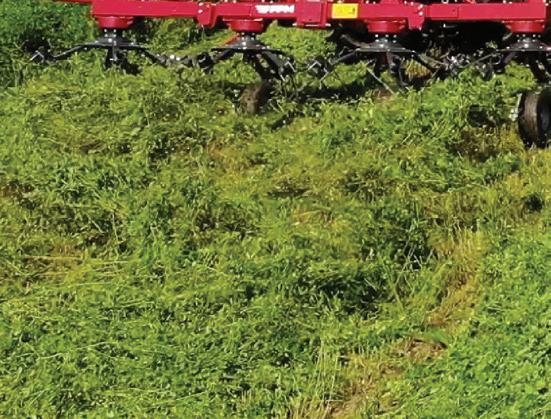






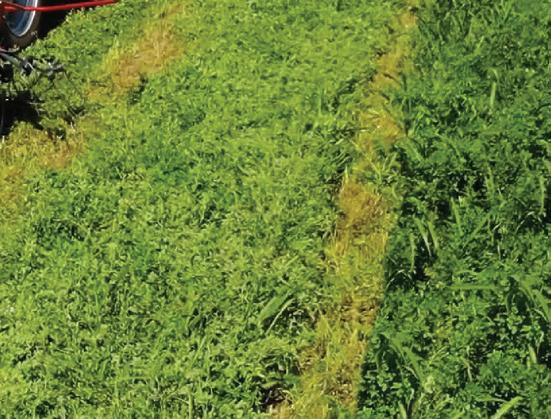






Around 57,000 young people have now learned something about farming and the countryside over two decades of Kent County Agricultural Society’s (KCAS) Living Land exhibition.
This year’s event at the Kent Showground saw another 2,800 children from school years 3 and 4 enjoy a free day of education in food, farming and the environment when it celebrated its twentieth year on 2 May.
This annual event offers primary school children an introduction to agriculture, horticulture and the countryside through hands-on activities, engaging displays and the chance to talk directly to experts from across the agricultural industry and rural community.
With support from the Kent Federation of Young Farmers’ Clubs, children met a range of farm animals including pigs, goats and alpacas and learned how livestock are reared for food and animal-based products. The animal zone also featured dog displays and heavy horses as well as a working milking parlour and sheep shearing demonstrations, while the moving machinery display saw
R W Crawfords and Tuckwells and Hope Contractors demonstrate straw baling.
The society’s general manager, Nikki Dorkings, said: “We are delighted to have welcomed another 2,800 pupils and their teachers to the Kent Showground this year.
Living Land, now a cherished tradition in Kent, offers Year 3 and 4 classes an immersive opportunity to delve into the agricultural industry, discover the origins of their food and explore rural traditions within their county.”
Chairman Julian Barnes said KCAS was “thrilled to be celebrating 20 successful years of Living Land”, adding: “This event is a testament to the enduring importance of agricultural education and its impact on future generations. It inspires us to see so many young minds eagerly engaging with the wonders of our countryside.”
Ashleigh Yates, who attended the event as a year 4 student, is now studying for a degree in agriculture with animal science at Harper Adams University, supported by a KCAS Kent rural scholarship. She said: “Living Land opened my eyes to the rural world around me and gave me the opportunity to get hands on
with different aspects of agriculture.
“It kickstarted my interest in the industry, a passion that has carried on throughout the years and massively influenced where I am now, from joining young farmers and showing livestock at the Kent County Show to beginning my degree in agriculture.”
Countrystyle Recycling was one of the Kent businesses that took part in the event, joined by colleagues from FGS Agri, FGS Organics, enVar and Verigreen, all companies that are part of Kent-based Heathcote Holdings.
Pupils were able to start growing sunflowers by filling seed pots with compost created by enVar, as well as trying their hand at litter picking. An art competition saw pupils create recycling themed pictures, with ten to be selected and displayed on the sides of Countrystyle Recycling waste collection lorries later this year.
Martin Heathcote, chief executive of waste group Heathcote Holdings, said Living Land was important “because it helps children make the connection between how we use the land to generate food alongside the need to ensure that we do everything we can to protect it”.

Dear sir,
British Apples & Pears Limited (BAPL) is delighted with the government response to John Shropshire’s independent labour review. At long last, our growers have the labour certainty they need to plan for the future. Our pleas have been answered.
Until now, apple and pear growers in the UK have not known from one year to the next whether or not they would be able to access the seasonal workers they needed to pick their crop. This kind of uncertainty has been incredibly stressful and entirely unnecessary.
With a seasonal worker scheme commitment to 2029, we can now plan for the long term. Just as we do when we plant young apple trees.
What is really important for government to understand is that we, as a sector, want to grow. We want to produce more apples and pears, and that means more labour not less. We hope that this government commitment to 2029 is associated with a growing number of workers to support our sector’s growth.
We would also urge the Government to look at extending the visa length from six to nine months to better reflect the reality of the extended fresh produce growing season in the UK.
In terms of this announcement, we also welcome the commitment to robotic picking technologies. This is an incredibly complex area and many technology companies have struggled to create a workable solution.
When you’re trying to replicate the expert eyes and gentle hands of an experienced fruit picker, it’s not easy. However, we are keen to see progress in the technology in this area and government support could definitely help.
With regards to automation of packhouses, most of our apple and pear growers are already using highly automated processes, but we welcome the further automation funding the government has promised in this area.
Finally, we want to thank John Shropshire for his thorough and thoughtful work. British apple and pear growers in the UK feel they have been heard at last.
Ali Capper, Executive chair, British Apples & Pears Limited
…a Woodland Management Plan grant offers: Minimum £1,500 towards a plan For woodlands of 3 hectares+
…a plan then unlocks the potential for entering a 10-year Countryside Stewardship grant to support management £127 /ha/year
With additional payments of a further £800/ha/year* And support for capital items such as fencing, access infrastructure, high seats



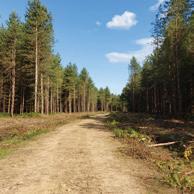


…the England Woodland Creation Offer supports planting: Minimum of 1ha area, made up of 0.1ha blocks
Potential for £10,200/ha, including annual payments of £400/ha for 15 years



With Additional Contribution Payments of £11,600* (*depending on designations)









Some years ago, at a reception in Kinsale, West Cork, graced by the attendance of a major western Ambassador, his sister and a mini-crew of Naval personnel among others, I was reminded of some experiences I’d had while working in France in the seventies.
Now I am absolutely useless in most social situations, having little or no ‘small talk’, so I tend to meld into the background and pray that proceedings will be brought to a swift end and I can go home.
In this case, however, I found myself standing next to the Ambassador’s sister and a Navy Captain, who were heavily engaged in the niceties of the social world. They were discussing their favourite places on the planet, and France came out tops. I edged closer and, as Shakespeare would say, “screwed my courage to the sticking place” and made my entrée to the conversation.
“I worked in France,” I said, “and I got bitten by a dog and run down by a bicycle.” They laughed, politely and briefly, but were careful not to encourage me. So, I melded back into the curtains.
Later that evening there was a dinner for
Another occasional contribution from Declan Hughes, Founder of the Irish Veterans Military History Charity.
invited guests, after which I had to make a speech explaining how and why the event had come to pass and my role in getting the project thus far. When the speeches were over and the guests began mingling again –but before I could slip away unnoticed – the Ambassador’s sister caught me, saying: “I’m so sorry, I didn’t think you were anyone, but you are. I just thought you were someone who was bitten by a dog and run down by a bicycle!”
I had been working casually on a hop farm in Kent and, in true ‘blindly falling in love’ fashion, I had inveigled my way onto a farm in the tiny village of Fontenois-les-Montbozons, in the deepest French countryside. I realised too late that this particular girl, while quite at home on a farm, actually lived in a very upmarket section of Paris, and my first night was spent in a room in her parent’s house, where I got bitten by the family dog.
The next morning, having washed my feet in the bidet – it was the first one I’d ever
seen – I was taken to the train station and bid a very firm “Adieu!”. I was left in the French countryside stewing in my own juice and vowing never to ‘chercher la femme’ again.
But I learnt a number of life-enhancing lessons while working hard and striving to learn a language I was actually, though I didn’t know it at the time, very much in love with. I still find myself tuning the radio to a French station and just leaving it there as I soak up the accents and inflections and the odd words that give me more than a flicker of recognition.
I well recall the time I was treated to a fantastic meal and, pushing back from the table when offered more, exclaimed (or so I thought) that I was full. How they laughed when I told them I was, in fact, pregnant.
That, though, was not something to admit to in a speech in Kinsale over four decades later as I fronted up the launch of the first international chapter of an important military history charity.












envirolac
Scientifically proven palm-free fat supplement for high-yielding dairy cows
Formulated to meet the cow’s requirements for specific fatty acids using locally sourced fats and marine oils.
• Higher milk yields • Increase in butterfat and protein
• Improved feed efficiency • Reduction in milk carbon footprint
• Does not affect dry matter intake or methane
• Increase in milk short-chain fatty acids and DHA
butacup extra
The unique fat supplement for efficient butterfat production
• Increases overall energy supply

• Supplies essential fatty acids and C16 fat • Improves overall liver function
• Reduces the risk of fatty livers
• Provides glycerine to boost the utilisation of fat in the diet
• Boosts the immune system
• Reduces heating of TMR diets





Shall we try cattle work?
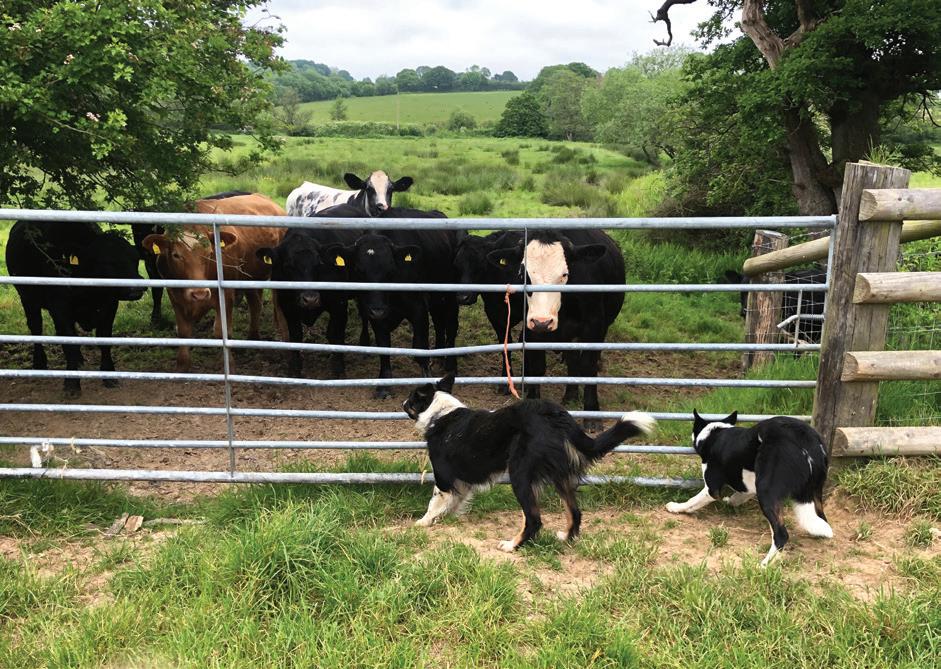

Granddaughters ‘helping’ get ready for farm gate sale

I should have known better than saying calving was going well. Although the actual calving wasn’t a problem, it was the get-up-and-drink-colostrum that proved challenging. A strapping calf born overnight laid in the shed amongst the rest of the herd, while the mother was standing at the feed barrier stuffing her face on silage. It was like she was in denial that she had calved; there was a complete disconnect between the two of them. The calf looked empty and had no vigour and the cow was disinterested in it. We penned them together. This calf took a lot of persuasion to get up and refused to suck. The cow’s udder was full and she wasn’t cooperative. We gave her food and were then able to milk out two litres of colostrum, after much perseverance, dodging of feet, aching hands and choice language. I berated my other half for not having hung onto a milking unit when his father’s dairy cows were sold in the seventies. Anyway, we then had to tube our
loot into the calf, which it didn’t appreciate. It kept it alive, however, and later we persuaded it to suck a teat on a bottle.
We tried and failed to get it to drink from its mother. Her udder wasn’t the best design; quite low to the ground, with short and stubby back teats and the front ones long but awkwardly angled. Once the calf had regained its appetite, it insisted that milk should be accessible from every other part of its mother’s body other than the actual bag. Having the patience to deal with a headstrong calf is frustrating, especially when you’re tired from lambing.
Milking this cow out on a regular basis wasn’t an option. We sourced some calf milk powder and, when feeding it, held the bottle down as low to the ground as the cow’s teats. We then gradually coaxed the calf to transfer onto its mother’s teats, which was no mean feat. The cow finally acknowledged that the calf was hers and, Alleluia, 48 hours later disaster had been averted.
This added stress took precious time and
made me question whether lambing and calving at the same time is such a great idea. But from herd and flock point of view, with the spring grass good for milk production, it seems like the optimal time. Neither shepherd nor herdsman is willing to move dates.
It’s at these busy times when mistakes happen; it just shows that we are human, doesn’t it? Other half and I were working together in a harmonious kind of way, emptying out the cattle shed. Sadly, this scene is not ‘open the shed doors, letting cattle into the adjoining field to frolic around in the lush grass’. The reality was sorting cows, accompanied by the correct calf, into batches and loading into our trailer, then ferrying them down to their summer grazing.
Despite vigilant checking of the paperwork by yours truly, we managed to mismatch one pair. We rectified this error late in the day, luckily culminating in happy reunions. Other half said: “Don’t tell Nigel.”





You ok in there?
It would be easy to get confused by the alarming assortment of milk in our farmhouse kitchen at the moment. There’s replacement lamb milk, colostrum, calf milk, pasteurised milk and raw milk plus breast milk for youngest grandchild. Labelling is key. We mostly get the right milk on our cereal.
In an effort to keep energy levels up, I baked a cake, which turned out to have an unusual flavour. I tend to free range with recipes, so I had added some apple to my sponge mixture and then I thought a spoonful of mincemeat and cinnamon would taste good. Unfortunately, I’d forgotten that I’d also made some apple chutney which I’d put into a mincemeat jar. I was in a hurry, lots to do and all that. Apple and chutney cake was an interesting combination; I topped it with lemon flavoured icing to help disguise my misdemeanour. Nigel said it was delicious before I told him about my error.
My food combination was an accident, but I was fascinated to learn that the cheese makers


Hazel and Martin are trialing some ice cream containing Pevensey Blue cheese and pear. They are going to be offering it to customers at our next farm gate sale. It certainly sounds different; I’m looking forward to trying it and will keep you updated on its popularity.
The bulk of lambing was over quite quickly, but there’s always a handful that string it out.
Wouldn’t you think that if you’d watched 138 of your colleagues produce lambs, you’d have an inkling of how to go about it? I spotted second to last ewe wandering around the field with water bag swinging. She stopped occasionally and peered behind her, as if checking to see if the lambs had dropped out. She took herself through the electric fence and stood next to the rams, one of which thought she might be good to have some fun with. At this stage I decided to intervene.
I’d never have caught her without Brie’s (sheepdog) help and my crook. I was expecting a problem, but no, twins, perfect presentation, she just wasn’t prepared to put the effort into

delivering them. I wondered if she’d have any mothering skills, but she did. I sat back on my heels to admire the scene and glanced back at Brie also watching, but 30 yards behind her stood a fox, cheeky fella. To keep the new family safe, I relocated them to the home paddock.
‘Legal beagle’ daughter invited ‘squirrels and beavers’ to the farm. These are younger versions of scouts, girls and boys aged four to eight. We entertained two groups of 25. It was mayhem, the bottle lambs were well fed and the cattle enjoyed copious handfuls of silage. The children loved the experience.
Complaining about the disconnect between town and country isn’t constructive. I believe that communicating with the public and educating the young about farming is paramount to maintaining food security and ultimately safeguarding the future of our countryside.
We’ve enjoyed watching series three of Clarkson’s Farm. Have you?

As residential conveyancers here at Whitehead Monckton we are pleased to report an upturn in property market activity. Good news for all homeowners and new buyers.
Mortgage rates are improving, giving us all more confidence to make those life changing decisions.
When considering a sale of your property, being prepared is key: having the appropriate documentation in place if you have carried out any alterations or renovations such as planning permissions, building regulation completion certificates, electrical, gas or fensa certificates can save you so much time and avoids unnecessary enquiries being raised by your buyers’ representatives. With any leasehold sale, make sure you have the landlord's consent for any alterations, make sure any service charge and or ground rent is paid up to date and obtain an up-to-date management pack. When purchasing ensure that all financial
matters are in place, with a mortgage agreed in principle if required; this also avoids disappointment if you find the home of your dreams and then can’t afford it. Try to avoid lengthy chains; generally a transaction will take eight to ten weeks to process from offer through to completion, but this can be achieved a lot sooner if everything falls into place. Equally this can become protracted with a longer chain and all parties in that chain having their own agenda, which is very frustrating.
It can be such an exciting time when buying your first home and indeed when there are both sale and purchase transactions. Whatever the circumstances, we are here to assist and guide you, explaining in detail what is required of you or from you, alleviating the processes to reduce any stress and time. We know you want to be in your new home yesterday and that is what we want to try and accomplish with all possible speed.
We are here to help you achieve your goal.

Having just returned from a fascinating trip to Morocco I was most struck, in an agricultural sense, by the way communities in the eastern parts of the country manage to utilise the hugely limited water resources they have.
The Todra River Valley is an oasis in the desert at the foot of the Atlas Mountains, with limited spring water supplied through a network of manmade overground water channels that allows the production of food and livestock feed over a 45km stretch of what would otherwise be desert, growing crops such as lucerne, wheat, barley and dates.
The value of the limited but free water resource as a staple was obvious, with systems to share it out evenly over the length of the valley forged over centuries. The area is extremely productive and, while only supplying the local community, it is critical to the local economy of the region.
This week South East Water released its 25 Year Environment Plan. We also learned of some work they sponsor on reducing waste, whereby various non-domestic users undertook a water usage audit, resulting in 54% less consumption per site after the recommended improvements were completed. Admittedly, these weren’t farm sites, but we also saw an example of substantial on-farm savings using technology that allowed intervention in unexpected usage patterns.
It is clear that the future requires real focus on preserving the precious resource we already have, reducing waste while working collectively to ensure it delivers value to all our communities.
As climate change and population growth put additional pressure on water availability, the agricultural sector must adapt to changing conditions and implement water management strategies to maintain productivity and resilience. In the debate around UK food security, water security must also be
considered to meet the following challenges:
• Climate change has led to more erratic weather patterns, including prolonged droughts, intense rainfall and increased temperatures. These changes can disrupt traditional farming practices and threaten water availability.
• As the UK population grows, demand for water increases, putting additional pressure on resources. This competition for water can affect agricultural water use.
• Outdated or inefficient water infrastructure can lead to water loss and reduced availability for agriculture. Investment in modernising water systems is needed to address this challenge.
• Strict regulations governing water use can limit farmers' ability to access water when they need it most. Balancing the needs of agriculture with environmental and social concerns is a complex challenge.
• Pollution from agricultural runoff, such as fertilisers and pesticides, can degrade water quality, affecting both farming operations and surrounding ecosystems.
As water becomes more scarce, here are some of the solutions farmers are already investing in and delivering benefits:
• More efficient irrigation methods such as drip irrigation and precision agriculture to improve water use efficiency, alongside more accurate weather forecasting.
• Building new on-farm reservoirs or expanding existing ones to help capture excess rainfall during wet periods for use during dry periods.
• Recycling and reusing water, such as treated wastewater, to supplement water supplies and reduce reliance on freshwater sources.
• Using practices such as cover cropping, no-till farming and crop rotation to improve soil health and water retention, reducing the need for irrigation.

• Collaboration between farmers, water authorities, researchers and policymakers aimed at developing comprehensive water management plans that address the needs of all stakeholders.
• Government programmes and incentives to encourage farmers to adopt watersaving technologies and practices, such as grants for efficient irrigation and water storage systems.
• Educating and training farmers on water management best practices to help them make informed decisions and implement effective strategies.
Water security is a vital concern for UK agriculture, impacting the industry's productivity and sustainability, and it is essential for the agricultural sector to adapt and implement innovative water management solutions. By improving water efficiency, investing in infrastructure and fostering collaboration among stakeholders, the UK can navigate the complexities of water security and maintain a thriving agricultural sector that supports both its people and its economy.
Investment in infrastructure, technology and research and development is going to be a critical element to this, together with lateral thinking such as reducing peak yield to deliver more consistency and reliability. Much of the solution will require some form of investment, and Virgin Money has a long heritage of working with and supporting the farming industry and working closely with customers on any requirements, both short and long term.
We understand how important it is for any farming business to invest in the future, and we are fully committed to helping our farming customers turn their plans into success in every area of their operations, including in the management of this fundamentally important resource.
JUSTIN ELLIS, B.SC. PMIAGRM


Ben Richmond really has ‘hit the ground running’ after taking over the helm of the construction company J D Richmond and Son Ltd less than 18 months ago.
Ben took over the business shortly before the company’s founder, his father John, died, and has continued delivering the high quality projects that the Richmond name has been known for across the South East since the early seventies.

In the past six months or so, he and his highly skilled team have installed four robotic milkers at a West Sussex dairy, built a bridge, erected a timber-framed building without instructions, built one industrial unit and extended another.
“It’s been a very busy six months, and it doesn’t look like slowing down any time soon,” said Ben, who is also continuing to work for an impressive customer base including many long-term clients.
“Margins are tight, with a lot of companies chasing the work, but we offer a competitive price and we have a well-earned reputation," explained Ben, who also keeps Sussex cattle at the company’s base at Dalehurst Farm near Horsham, West Sussex.

One of J D Richmond and Son’s long-term customers is T and M Gue,



at Huddlestone Farm, near Steyning in West Sussex, which has used the business since 1989 and contacted Ben in December when Keith Gue took on a new dairy business at the nearby Thakeham Place Farm. Keith wanted to replace the herringbone parlour with robotic milkers and asked Ben’s team to install the high-tech kit. They had to do the job



in stages, tackle some tricky layout issues with water pipes and work around existing farm and dairy operations, but finished the job on time and on budget.
“J D Richmond and Son Ltd have done a fantastic job of the robot rooms at Thakeham and Huddlestone,” commented Keith Gue. “It’s always great to work with these guys; they are reliable, professional throughout and complete works on time."
Near neighbours of Ben’s, Andy and Amy Ilsted, of Amies Hill farm, Horsham, contacted J D Richmond and Son when they needed to access four acres of land they had bought on the other side of the River Arun. As well as fabricating and installing a steel girder bridge with a reinforced concrete slab strong enough to take a tractor and trailer, Ben carried out the necessary negotiations with another neighbour to allow him to access the site and carry out the work.
The same client had also bought a second hand timber-framed building which had been delivered to site but needed erecting. “It was just a pile of bits when we arrived, albeit neatly stacked,” Ben explained.
“There were obviously no instructions as it was second hand, but we figured it out, erected it and will be cladding it with featheredged boarding. We also adapted the opening so it will take a roller shutter door."
J D Richmond and Son also erects industrial buildings and created a new warehouse at Slimfold in West Sussex for an aviation business. The work involved digging back into a hillside and building retaining walls as well as doing the groundworks, erecting the steel frame, cladding the building and installing a power-floated floor.
At a site in Charlwood, West Sussex, the landlord had already rented out an industrial unit which involved extending an existing building, giving Ben and his team a tight deadline to finish the work so that the new tenant could move in. The work included installing four flues through the ceiling, along with a valley gutter, roller shutter door and two personnel doors, but was completed on time.
“It was a challenging project, but I have a great team which is driven by an overriding ambition to do the best possible job every time,” said Ben.

This month Nigel visits James Seller, a fourth-generation mixed beef and arable tenant farmer at Park Farm in Arundel, West Sussex, to find out more about his farming business and his move to more regenerative agriculture practices over the past couple of years.
Turning off the busy A27 down a concrete drive signposted Park Farm, the first thing I notice as I approach the farm is the imposing flint barn to my right which has clearly been converted into business units by the Norfolk Estate. I take the left-hand entrance and arrive in the farmyard, parking up opposite a beautiful old flint farmhouse. James greets me at the front door and invites me in for coffee and a chat at the kitchen table.
He and his wife Helen are Agricultural Holdings Act tenants of the Norfolk Estate and the fourth generation to farm at Park Farm. His great grandfather Samuel and grandfather Will came to the farm in 1922 before his father John took over 1962. After studying Agriculture
at Newcastle, James returned to the farm in 1985, working alongside his father until he died in 2019.
Today the family business comprises three main enterprises; arable, which accounts for just over two thirds of the 148 hectares, and another 40 hectares split evenly between a suckler herd of Sussex cows, introduced in 2014, and a well-established horse livery business set up in the 1990s.
The land, which is just inside the South Downs National Park, is predominantly grade 3 flinty clay soils over chalk, said James. Much of the farm is exposed, he added, with far-reaching views of the south coast from the top of the farm.



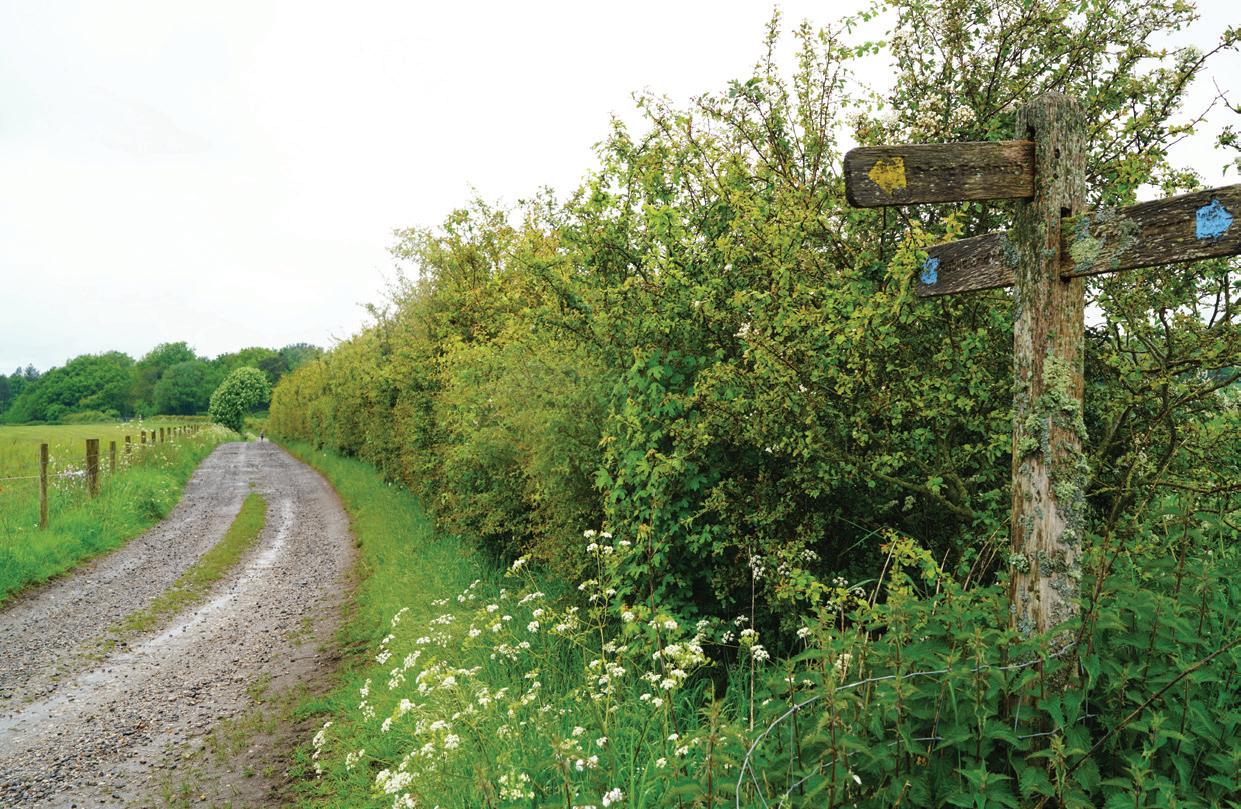
He explained that his grandfather, like so many, spent much of the thirties removing hedgerows because of the cost of labour needed to maintain them by hand, and he has spent the past 13 years reinstating them, with the help of Colin Hedley and the National Park rangers.
In the past couple of years James, who turns 60 this year, has started transitioning to regenerative agriculture.
“I’m enjoying my farming more than ever,” he said, adding he felt that ‘regen ag’ was more of an ethos than a set of rules or standards.

He acknowledged that a lot of the principles have come from the organic movement but said the answers are unique to each farming unit, making certification difficult. Regen, he said, sits between organic and conventional agriculture. Where, depends on you and your farm.
At Park Farm, James has been implementing rotational grazing practices and growing more cover crops on his arable ground to improve his soil health. He’s also been integrating livestock which graze his cover crops, something he thinks the government is keen to encourage arable farmers to do more of through Sustainable Farming Incentive agreements.

• 148 hectares (366 acres) –mostly grade 3 soils (flinty clay over chalk)
• Two thirds of land down to arable cropping, with remaining third split between permanent pasture for cattle and livery horses
• Conservation grazing on 12 hectares of county council owned land managed as Duke of Burgundy butterfly habitat
• In Countryside Stewardship and in the process of transitioning to Sustainable Farming Incentive
• Grows Southern Water cover crops
• Has planted 1.5km of hedges (replacing all those his grandfather took out in the 1930s). Also regularly lays hedges.
• Herd of 30 Sussex cows (with around 90 cattle at any one time on the farm)
• Fattens all steers and heifers not kept as replacements and sells via Hailsham Market
• Arable work all done in house
• Member of the Arun to Adur Farmers’ Group
• FiPL grant for an aerator and electric fencing and water infrastructure
• Part of South Downs Pasture and Profit in Protected Landscapes – which started in 2023
• Income breakdown over past five years: cattle 5% to 10%, arable 40% to 50%, livery 25% to 35%, BPS dropping 19% to 11%, environmental 5%, house let 5%.

The process has been a huge learning curve and James likened the transition to “going back to school”. A key learning resource has been the Precision Grazing (www.precisiongrazing.com) group led by Cornish farmer turned entrepreneur James Daniels.
Daniels founded the business in 2016 to help UK farmers implement and manage their grazing systems. He helped James draw up a grazing plan for his farm and, after receiving a Farming in Protected Landscapes (FiPL) grant through the South Downs National Park, James purchased Kiwitech electric fencing and water infrastructure, sourced via the www. progressivefarming.co.uk website.
The group’s annual subscription includes monthly webinars, farm walks, a two-day on farm conference and access to the Precision Grazing WhatsApp group that has been “an invaluable tool” for farmer members to ask questions and post updates.
After installing all the infrastructure, James spent last year learning the system. He moved his main spring calving group of 26 cows and followers to a fresh paddock every six days on average.
This year he plans to target three-day moves to prevent his cattle grazing any regrowth, which he believes will yield better results. He also hopes to increase the size of his familial groups, making management less arduous.
James is also a member of the South Downs Pasture and Profit in Protected Landscapes programme (isabella@pastureforlife.org) led by Ali Laws and Isabella Goggin, which started up last year. He said it's been useful to have a group on his doorstep for farm visits and has helped build community among like-minded farmers in the National Park.
In the future James would like to become Pasture For Life certified and believes his Sussex cattle are ideally suited to finish off grass or
FARMING AND ENVIRONMENT
FOCUSED JOURNALISM AND DIGITAL CONTENT CREATION
Storytelling through interviews, features, case studies, photography and videos.
For enquiries contact Nigel Akehurst via email on nigel@indiefarmer.com
Instagram @indiefarmer www.indiefarmer.com


cover crops. At present he feeds a bit of concentrates in the last two or three months to add a bit of finish, before taking them to Hailsham Market. He aims to finish his cattle at between 19 and 24 months, averaging a live weight of around 560kg, and they tend to be bought by local butchers who favour the local breed, he said.
All the arable work is carried out in house, including the combining, said James. He trialed working with a contractor back in the nineties for a few years but ultimately decided there wasn’t enough margin in it, as a tenant, so decided to retool with cost-effective, second-hand kit and hasn’t looked back.
He has moved away from spring crops like barley and beans and now focuses on a mix of winter cereals such as wheat and oats, and cover crops, finding them more reliable and profitable.
Southern Water pays him £135 per hectare to grow cover crops as part of its nitrate scheme to improve water quality. They tend to go in after harvesting winter cereals to improve soil heath and keep a living root in the soil over the winter. The crop also provides fodder for cattle to graze from mid-January to mid-March, allowing James to protect his permanent pasture for grazing in drier weather.
Historically they used a plough and power harrow for all cultivations, but in recent years have switched to a low-disturbance subsoiler that lifts the soil 8 inches to allow air into the ground followed by discs to prepare a good seedbed for their Weaving tine drill.
This last autumn James decided to plough a large area to deal with a grass-weed problem, taking advantage of a good autumn window, but otherwise he aims to turn the soil as little as possible.
Yields on his wheats tend to average around nine tonnes to the hectare, though he admitted last year’s harvest was somewhat below that.
James is one of 20 farmers who make up the Arun to Adur Farmers’ Group. The group is a voluntary initiative set up by Colin Hedley in 2015 and covers nearly 11,000 hectares of the chalk downs between the two rivers. The group’s collective work delivers coordinated conservation benefits on a landscape scale.
Cluster group officer Tammy Harris organises farm walks, social events with young farmers and training sessions. A recent event involved farmers going out with a local bird recording group to learn more about “the little brown jobs” on their farms, which James said

was a fascinating learning experience.
The group also participates in the Big Farmland Bird Count, an annual bird survey, and Open Farm Sunday, a great opportunity to engage with the public, he said. The events are popular, added James, who spends time answering questions during tractor and trailer rides on the South Downs.
I asked James what he loved most about his job? “Improving the environment; farming can be part of it,” he replied.
As a mixed farm it has always been a haven for wildlife, he said, but he’s noticed a marked increase in the number of birds and biodiversity since carrying out more Countryside Stewardship-funded environmental work on the farm.
They have planted over 1.5km of new hedgerows over the past 12 years and are now beginning to lay some of the older hedges, work that is carried out by Colin Hedley in return for the Countryside Stewardship capital grant payment, he explained.
As we drove around the farm, James pointed out some of the new hedges the National Park rangers have also been laying. We saw a group of yearling cattle grazing a cover crop with a fenced off wildflower strip full of flowers. Flying overhead were skylarks, and James pointed out several yellowhammers.
James is also keen to reduce the amount of artificial nitrogen he applies to his land and pointed out a large field of AB15, a two-year agreement to provide habitat for wildlife and fix nitrogen. He has also experimented with foliar nitrogen application to feed the leaves



rather than the soil.
Another environmental project James mentioned was a block of 12 hectares over the hill owned by the county council. It’s an important habitat and home to the Duke of Burgundy butterfly. To help manage it, James takes a group of his dry cows there from July to September to carry out conservation grazing.
James runs a horse livery which he set up on 20 hectares of the farm in the early nineties. The business employs a horse livery manager, Vicki Stock, and represents a vital non-farming income stream, accounting for nearly 35% of their income.
More recently James looked into setting up a paw paddock on the farm for dog walkers, which he said could potentially bring in £25,000 a year, but after seeking planning advice decided against it because of potential highway access concerns.
James plans to continue working towards Pasture for Life certification for his beef production, making better use of his cover crops to finish cattle over winter and achieve a larger frame, he said. He is also keen to experiment with not weaning calves and running larger family groups to simplify herd management. This, he feels, will allow him to achieve a better work/life balance. Outside farming both he and his wife are keen motorcyclists, and he said a big part of going regen was the opportunity to have more time away from the farm to expand his farming horizon and see more of his family.

















Mixed forestry – like mixed farming – is an efficient way to make the best use of timber in a varied woodland while benefiting the environment, creating a nature-friendly habitat and delivering a return to the landowner.
As with mixed farming, to really maximise the returns from a range of trees means investing in the right equipment, skills and knowledge base – and that’s where South East Forestry’s impressive track record really shows.
Jon Davies and Dave Holmes lead a wellqualified, professional team that has the expertise to assess the best use for standing timber, modern, purpose-built machinery to harvest it safely and efficiently with minimal impact on the forest floor, and the skills to put every last piece of timber to the best possible use.
The company also benefits from having its own yard and sawmill at Hawkhurst in Kent, a facility that allows it to extract maximum income from timber other woodland management companies might well dismiss as firewood or biomass woodchip. That increased value is important, as it means the company can offer the landowner a better return.
“We see turning timber into woodchip as the last option,” explained Dave Holmes. “If we can use it for fencing, construction or furniture it has more value and also locks up the carbon that has been sequestered during the growing process. Burning timber just releases all that carbon back into the atmosphere.”
Having the yard and sawmill, recently upgraded with new machinery, means South East Forestry can store valuable timber until it can be put to the best possible use and can ‘straighten up’ misshapen trees into usable planks or beams.
The commitment to the environment that



sees as little harvested timber as possible used for woodchip or firewood runs through South East Forestry’s entire approach to forestry management.
“Thinning the woodland allows the remaining trees to fulfil their potential and allows more sunlight to reach the floor and support wild flowers. That will in time bring back butterflies and birds and help create a much more diverse environment within what was once a dark and tangled woodland,” commented Jon.
“Again, from an environmental point of view, while all trees sequester carbon, healthy young saplings do so much more efficiently than older, less vigorous examples.
“Our aim is to deliver the maximum value to the landowner by finding the best end use for the timber we harvest while leaving the woods and the environment in better shape.”
South East Forestry was recently brought in to manage an area of woodland that is typical of many across Sussex, Surrey and Kent and had become overstood over the years.
“We have agreed a plan that will re-establish a number of rides within the wood, benefiting the shoot on the estate, thin the hardwood to favour the better trees and let in more light, coppice the sweet chestnut and thin the conifers, using the timber for construction,” explained Jon.
“This is a typical mixed woodland with some low grade timber that will inevitably go for woodchip or firewood, but we always aim to keep that to a minimum,” he added.
“Using timber, particularly conifers, for construction is always our preferred option as it is totally sustainable. The tree grows and locks up carbon, it’s cut down and put to good use and then you plant another one in its place,” said Dave, before pointing out: ”You can’t grow steel or concrete.”



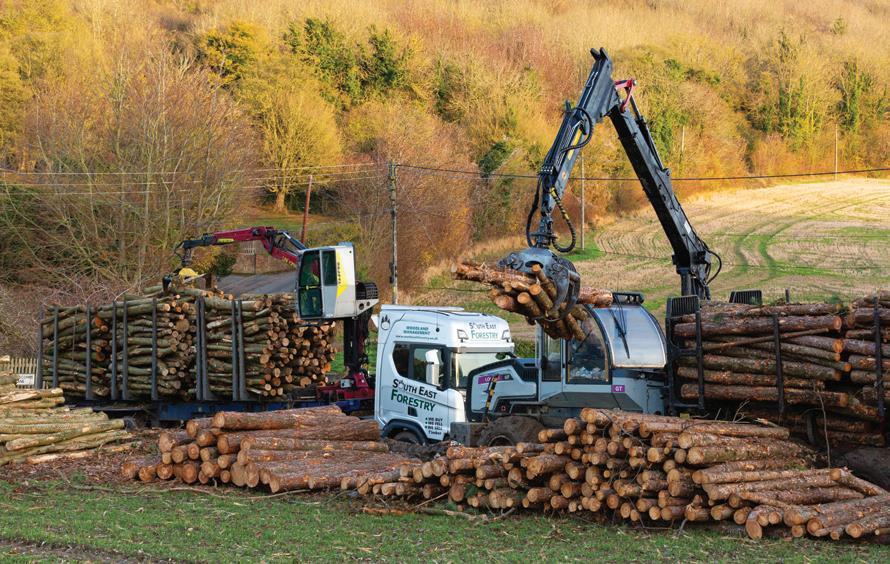


Unmanaged woodland? Overstood coppice falling over?
Timber growth stopped due to too much competition?
South East Forestry can provide financial returns from unmanaged and neglected woodland.
We are looking to purchase large volumes of woodland grown standing timber. All hardwood and softwood species sought
South East Forestry: We buy –We fell –We sell timber Call Jon Davies on 01580 819179 or 07759 567801
Miscanthus originated in South East Asia and was imported initially as a decorative grass for gardens; it’s sometimes known as ‘elephant grass’. However, its properties are such that it is an ideal source of energy for biofuel. It is also a sustainable solution for farmers and the environment as it contributes to improved soil, air and water health, boosts biodiversity and reduces fertiliser and pesticide use.
For farmers who have some poor soils, awkward small fields that do not take today’s
Richard Shepherd-Barron investigates the benefits of a crop that needs minimal inputs, is ideal for poor soil or land which is prone to flooding and is in demand as a biofuel.
large machinery easily, strangely shaped fields that could handle a crop to ‘square up’ the cultivated areas or land prone to flooding, the properties and value of miscanthus could well be attractive.
The demand for miscanthus as a highly sustainable and renewable crop is increasing as a result of the development of new raw material uses including UK heat and power generation. Growing to between three and four metres tall, this crop meets the industry’s requirements because it is fast growing, has a low mineral content and is high yielding.
The variety Miscanthus Giganteus is a non-invasive hybrid which is not capable of spreading through seed distribution. This, alongside its other environmental benefits, which include carbon capture in the soil and its ability to improve soil, makes it a compelling choice for farmland diversification as a long-term, environmentally friendly, low maintenance investment decision.
A survey carried out for the GCB Bioenergy Journal in 2022 showed that 94% of the farmers growing miscanthus reported benefits to their farm business. These farms had converted areas of their farms from a mix of arable and pasture land. The majority of those surveyed reported benefits in terms of improved profit margins due to reduced workload

and lower labour, input and maintenance costs.
Soil erosion was improved on lighter, sandy soils and the reduced need for spraying was seen as environmentally helpful for land near water courses, recreation areas or housing. No spraying or fertiliser applications also means less run-off, which is highly important in a nitrogen-sensitive catchment.
There are no known diseases affecting the crop and almost no pests, while the rhizome returns nutrients to the soil. Some herbicides may be required during establishment, but very little thereafter. In autumn, as the leaves fall from the stems, there is a considerable return of nutrients from the decomposing leaf litter, which also helps to suppress weeds and conserve water, meaning no fertilisers are needed.
Currently, it seems that the best part of the UK for growing miscanthus is the southern UK, where it has delivered long-term, consistent income and environmental benefits on less productive lands. The wetter and warmer the area, the better the crop, which is now more affordable and profitable thanks to the sustainable farming incentive, which can provide payments from £5.80/ha up to £673/ha, depending on how the land is designated; the easiest option is £45/ha for no spraying.

Miscanthus is a large, fast-growing, easy to plant and harvest grass plant which absorbs CO2 five times faster than fast-growing trees. It has a permanent root, or rhizome, from which it generates new growth repeatedly when the stems, which can reach four metres in height, are cut down. Thus some of the carbon is released when the crop is burned as biofuel, but much remains locked below ground. It takes about two years to establish but then it grows consistently for up to 20 years.
Richard Hartley farms arable crops and pigs on 540 hectares near Witney, in Oxfordshire, and chose miscanthus as some of his land is split into small, awkward fields with poor access and poor drainage. He describes it as “hungry” land that is low in nutrients so hard to farm and high in input costs.
He said: “There have been poor results from combinable crops on these fields. Our machines are bigger nowadays for the rest of the farm and unmanageable in these small fields. It was very expensive land on which to grow wheat, but now fits into our farming plans and [miscanthus is] very worthwhile to grow with always pretty respectable results.
“We’ve found that miscanthus benefits us in lots of ways. It’s an energy crop with minimal inputs and while it’s a complete diversification for us, having miscanthus in fields where previously there were cereal crops has helped to protect us against poor cereal prices.“
Richard works with Terravesta, specialists in the miscanthus supply chain. They provide a professional and comprehensive support service to farmers, with individual cash flow modelling before planting, agronomic date and advice, specialised planting and soil cultivation equipment, successful planting protocols, high quality planting materials (the rhizomes) from Europe’s largest miscanthus nursery, drone surveys to measure establishment success, specialist logistics services and software and long-term, index-linked purchase contracts.
Over the years Terravesta has developed biomass supply projects in collaboration with industrial users, offering benefits such as low-moisture biomass, tailored logistics, growth opportunities with new plantings, and new growers. A farm walk in Norfolk in May included a visit to the Snetterton biomass power plant.
Anothe organisation supplying the miscanthus rhizomes is a grower co-operative called Miscanthus Nursery Ltd, based in Taunton, Somerset. It provides UK-grown rhizomes and specialises in all aspects of growing, harvesting and marketing this environmentally carbon rich crop, providing expert advice and information based on 20 years’ experience. Miscanthus Nursery facilitates small and large community projects for developing direct heat supply contracts and other nature-based solutions, including dust free biodegradable animal bedding.
Little is known about the productivity of miscanthus in flooded and moisture-saturated soil conditions, so researchers at the Earlham Institute in Norwich investigated the differences in waterstress tolerance among miscanthus species to guide genomicsassisted crop breeding.
Although researchers observed a significant loss under drought conditions in all of the four miscanthus species studied, in flooded

conditions the biomass yield was as good as, or better than, under controlled conditions in all species. The low number of differentially expressed genes and higher biomass yield in flooded conditions supported the growing of miscanthus in flood-prone marginal land.
Dr jose De Vega, of the Earlham Institute, said: “Miscanthus is a commercial crop due to its high biodiversity productivity, resilience and ability to continue photosynthesis during the winter months. These qualities make it a particularly good candidate for growing in marginal land, where yields might otherwise be limited by wet winters and scorching summers.”
Miscanthus is a crop which compliments conventional agriculture as it makes good use of land which would otherwise be unproductive and delivers yields that are less variable from year to year compared with other crops. It needs attention only at times when other farm work is low and the demand for the product exceeds supply, thus providing a steady long-term income.


Miscanthus - the low input, high yielding crop that provides impor tant raw materials for industry.
Now is the time for you to take advantage of green oppor tunities.
Email- enquiries@miscanthusnursery.co.uk

































































































The truly immersive event made use of the state-of-the-art setting to allow those attending to be dazzled by the easy-to-use new features of the program. Nick Rainsley, Hutchinsons’ head of marketing, opened the event by explaining that the upgrade to Omnia will be a significant step forward, allowing precision technology to seamlessly improve the business lives of the nation’s food and wine producing farmers.
The ease of use of the program that was displayed to those in attendance belies the obvious effort that has been included in the development of the new features.
Since 2016, the Omnia Digital Farming system has been steadily moving forward and has always been focussed on what the 4,000 users, who farm 1.5 million hectares, need from their data collection technology.
Gordon McKechnie, managing director, explained that one of the driving factors in the development of the Omnia upgrade was to put greater focus on what can be done with data and how this can help farmers and growers increase profitability and production. It does this while helping to mitigate the negative effects of climate change by allowing data analytics to inform the implementation of sustainable farming practices.
A main theme of the presentation highlighted that the new features have been developed to fill the needs of farmers, growers and specialists who will use the technology, influenced by a farmer focus group, an agronomist focus group and spray operators across Great Britain.
Some of the requests from users included the “ability to use the platform for financial reporting” and to “use Omnia as a one port of call”. One farmer explained that he wanted the program to be a guide that is specific to individual fields, and there has been an exponential effort by the team developing the technology to ensure that it can achieve all of this and remain easy to use.
Oliver Wood, head of Omnia, explained that Omnia is now sitting centrally to provide a single platform that can genuinely solve the problems of the modern farm“although not the rain,” he joked. On why this move had been made, he said: “We are a relatively small market in terms of the
Hutchinsons has announced the launch of the next generation farm management system, which will mark a significant advance in the Omnia Digital Farming program. The event was held at The Frameless Gallery in London, which proved the perfect location to highlight just how impressive modern technology can be.

global technology players.” Hutchinsons has therefore made a brave move to create a system specifically designed to be used for farming in Great Britain.
Functionality will provide complete digital traceability; one of the new features is a new spray module which has integrated core data from the food and environment research agency which will allow spray plans to be checked for compliance with current legislation. When non-compliance is detected a warning and explanation is provided. Lewis McKerrow, Hutchinsons’ digital farming manager, explained that this will even check compliance across wider periods of time. “For example, some products have a three year maximum loading and the new system will find that,” he said.
There will be no extra charges for the new program applications and it will operate
at the same service level prices that are currently available. The system will go live on 7 June, with the Hutchinsons stand at the Cereals arable event on 11 and 12 June dedicated to the new Omnia EasyPlan Upgrade.
It was clear that this launch is just the beginning and that Hutchinsons has no intention of standing still with this new precision technology; it will continue to grow and adapt just like the industry it has been designed to support. For more information contact Hutchinsons.
T: 01945 461177
E: information@hlhltd.co.uk www.hlhltd.co.uk







 SARAH CALCUTT Honorary Chair, National Fruit Show
SARAH CALCUTT Honorary Chair, National Fruit Show

The top fruit sector had two strong ambassadors at the 2024 Downing Street Farm to Fork summit. With Carmella Meyer of Peake Fruit, widely recognised as the industry’s expert in Producer Organisation (PO) schemes, and James Simpson of Adrian Scripps Ltd, widely acknowledged as one of the leaders in orchard fruit production, we were well represented.
British Apples & Pears, under the leadership of Ali Capper, has been lobbying effectively for support of its membership, which has seen a reduction in returns, extreme labour sourcing issues and rising costs.
The quote on social media from those running the campaign opened with: “The future of British orchards and the growth of British apple and pear volumes is definitely looking brighter today!”
British Apples & Pears outlined the following initiatives:
• Up to £10m for English orchard growers to access equipment, technology, and

infrastructure – this fast-forwarding investment will give our sector the critical confidence it urgently needs right now.
• The doubling of funding for a retained EU scheme replacement in the PM’s announcement. We will need to look carefully at the detail to ensure it doesn’t add more red tape with any new structures, but that notwithstanding, it’s very welcome news.
• Finally, the food security index is a positive move. We’ve been in desperate need of a device like this that can drive home-grown fruit and veg production. We’re not surprised at all that this year’s index has revealed that UK farming is at its most productive since records began - it’s something our apple and pear growers tell us all the time.

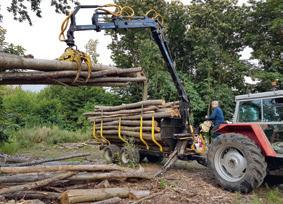


So, what does this mean in reality?
Funding of £10m doesn’t seem like a lot, but when split through grower groups and collaborative projects, there is a lot of impact from a pot of this size. With the labour situation unlikely to improve any time soon, the need to increase availability of technology that will improve efficiency, crop scheduling data, crop estimation, early identification of diseases and the spot treatment of issues will all reduce costs. Anything that ensure that production opportunities are maximised must be a priority.
EU scheme replacement? Well, the Basic Payment Scheme hasn’t really been a thing for fruit growers, but if this also encompasses the PO scheme which has been transformative for many growers, it can only be a good thing. In the broader sense, anything that recognises the costs involved in delivering environmentally sustainable production systems and supporting the continual evolution of farming must be a good thing.
And the food security index, at last! We all know that food that travels a short distance to the shelf, grown to the highest standards by growers who are conscious of their legacy must be the right thing. Homegrown food has been so far down the list of priorities that there have been times when we have felt forgotten in the face of trade deals that disadvantage the British industry.
On to fruit show news; well, if you’re thinking about exhibiting, I’d get your skates on. The amazing new team at the show has been busy booking in companies and the Maidstone Hall is filling fast, boding well for another vintage National Fruit Show this year.

As a horticultural agronomist based across Kent and Sussex working with Hutchinsons, I have over the past three years had the pleasure of working with, and learning from, the top specialists in all horticultural crops. Hutchinsons has a warm, friendly and supportive culture that reflects the family ownership of the business.
As a child I grew up embracing the outdoors, both beside the sea and in the countryside. I developed a passion for the environment and naturally gravitated towards environmental research. In later years I became one of the first individuals to discover microplastic pollutants in UK waters.
I began working as a plant health inspector with the Animal and Plant Health Agency, where my environmental science background and regular contact with growers naturally led me to the world of agronomy and my transition to Hutchinsons. I am excited to be writing for the readership of South East Farmer and aim to provide a monthly overview of horticultural spotlights. This month I’ll be looking at scab and blue bug aphids in orchards, how to mitigate the effect of frost in vineyards and dealing with cutworm damage.
The most pertinent subject at this time of year for apple growers is (drum roll)… scab. The high amount of rainfall at the beginning of the year, coupled with the current warmer temperatures, has led to symptoms now becoming visible on orchard leaves. There is a high risk of secondary infection, particularly when rain is forecast, so consider using Dithianon or Captan as protectant and eradicant measures.
We are starting to observe the curling of outer rosette leaves notably caused by the feeding of rosy apple aphid. Commonly referred to as ‘blue bug’, these aphids will create small and malformed fruits that won’t be worth picking. To protect your crop, Spirotetramat is the best option as this will control woolly aphid and mussel scale if timed with egg hatch.

In vineyards we saw sporadic frost events at the end of April that edged into May. Young vines in tubes seemed to be the worst affected as well as, unsurprisingly, those that are situated in frost pocket areas at the bottom of valleys.
The impact of the cold weather on the foliage at the beginning of the season is now becoming visible as yellowing and pale leaves. To combat this and boost your vine growth, you may want to apply a seaweed extract (Ascophyllum nodosum), which helps to boost the plant’s natural defence mechanisms and helps them overcome stress from either environmental factors or pest and disease. Importantly, the seaweed extract is grown using a sustainable and controlled approach which harmonises with the sensitive nature of the environment while maintaining the highest quality harvest. The greatest threat faced by vineyards to date has been cutworm damage. The larvae of the turnip moth hides in the soil during the day and climbs the vine at night to graze

on developing buds. One way of managing the population is to maintain excellent weed control and the other is to use an insecticide. Contact insecticides need to be applied when the pests are actively grazing, so remember to spray at night time – it’s a test of your dedication!
This month, we have announced a major upgrade to our Omnia Digital Farming system, creating the next generation in farm management software for British farmers and growers. This update represents a major digital leap forward in crop production which confirms Omnia as the most advanced and easy-to-use farm management system.
The EasyPlan upgrade offers a set of exciting developments within Omnia, allowing for completely paperless record keeping and work management, setting a new standard for farm management technology in the UK. It’s a British system for British farmers and one not currently offered by any other precision software provider –and it will be launched to growers at events this summer.
With oilseed rape planting decisions for this autumn likely to be a delayed and, potentially, spontaneous decision for many, at the time of writing there is still projected to be around 300,000 hectares planted.
Peter believes this may vary significantly nearer drilling time, depending upon commodity prices, Sustainable Farming Incentive decisions made in the spring and, most importantly, the soil conditions in July, August and September.
This will be enhanced further by any increase in prices, which at the time of writing are suppressed at circa £370 per tonne.
Oilseed rape still works for many growers, albeit in much reduced numbers. However, the biggest consideration remains conditions at time of planting; if soils are warm and, more importantly, there is sufficient moisture, then oilseed rape still provides a very viable option in the crop rotation.
Hybrid varieties offer the best case for establishment and, indeed, the key traits for the growing season have not wavered; in fact the case has hardened in their favour.
Aurelia from Limagrain UK will remain popular and is currently the market leader in terms of planted area, but newcomer LG Academic perhaps now offers a little more across the board and is a better option for the north, while sitting well placed on the recommended list.
Peter Brundle, Hutchinsons seed manager for the south, believes that despite recent challenges, oilseed rape still offers a viable option in the rotation.
also still be considered, as its gross output supersedes Aurelia, with the now familiar LG traits.
Other hybrid variety options include Maverick from LSPB, newly added to the candidate list and which has excellent disease resistance on offer, scoring 7 for LLS and 9 for Phoma. It also possesses TuYV resistance and RLMS Phoma genetics, therefore offering a different option for crop management.
Pioneer’s PT312 offers TuYV resistance and Sclerotinia tolerance. Sclerotinia tolerance has also been shown to have as much as a 15% advantage in yield in untreated trials. PT312 also has very good oil content at 47.6%. It also has very strong scores for standing ability.
oilseed rape this autumn.
Clearfield® is a simple choice, Peter notes. Matrix CL remains the current standout performer and tops the ADHB listing for this category.
He recognises that clubroot is likely to remain a widespread challenge. LG Scorpion ticks all the boxes here, with excellent vigour and establishment, decent disease scores and TuYV resistance. Although not on the recommended list, it has attributes that current recommended varieties cannot match.

Limagrain’s Aviron's excellent vigour in both autumn and spring make it a key variety for later drilling opportunities. Attica should
DK Excentric offers the same traits as the highlighted Limagrain varieties, with yield not dissimilar to Ambassador. While not the highest gross output, Dekalb is closing the gap, supporting all their variety sales with an establishment scheme which may prove the decider as to whether or not to venture into


Conventional varieties will remain in favour for the home-saved seed market. Newly recommended Pi Pinnacle steps into the frame, while Peter’s other top picks are Acacia, KWS Campus and Annika for those who want the TuYV trait in a conventional variety, although he believes the trait is better served by the hybrid offer.
BRUNDLE



This month’s contribution comes from Simon Roberts. For what has felt like a relatively cool and wet season, there was an alarming amount of brown rust appearing in susceptible wheat varieties at the end of April. The disease thrives on 15 to 22 degree temperatures, which is why it usually appears late in the season.
This year’s early drilled, fertile sites and lack of cold temperatures brought us the perfect brown rust storm on the south coast. Fortunately, we still have Tebuconazole to eradicate it swiftly and this has been applied as a T1.5 spray; what would we do without it?
For now, the rust is under control, but product selection at flag leaf and ear spray and focusing on improved coverage will be crucial for longer lasting protection. To achieve this, consider increasing water volumes up to 200L/ ha and keeping forward speeds down as this will direct the spray down through the canopy onto leaf 2 and 3 as well as getting into the leaf axil. As all fungicides are acropetal (move towards the leaf tip), poor coverage at the base of the leaf is highlighted by disease reinfection at this point.
While brown rust has been a focus in a few varieties, the spotlight remains on Septoria Tritici as it continues to thrive in these perfect conditions. We have had a good year for new fungicide registrations, with two new actives available. Isoflucypram (Bayer) was registered before the start of the season, and Pydiflumetofen (Syngenta) gained registration in time for the flag leaf spray. They are both
carboximide chemistry and trials results show they will prove to be a positive addition to the fungicide options we already have available. If the unsettled weather continues into June, we may well need to consider a more septoriaactive ear spray, as well as the usual focus on rust top up and fusarium suppression.
With good milling wheat premiums available, we approach the last opportunity to fine tune the nitrogen input to ensure the required protein level is achieved. Some contracts don’t allow foliar nitrogen applications, so this will have been taken into consideration with extra solid nitrogen. Obviously, a good helping of sunshine will be required to fulfil the yield potential and then decisions on which crops will get the final top up of 40kg of liquid nitrogen will be made. Where liquid is being used, avoid intense sunlight, windy conditions and high temperatures to avoid any scorch.
Spring crops following over-wintered cover crops have been under heavy slug pressure. Wherever sheep have grazed the cover crop, there has been a noticeable reduction in slug activity and this has been efficient in reducing the biomass and converting it into a utilisable form of nutrient for the following crop.
Maize growth, and ultimately final yield, is impacted if it has to compete against weeds
during its early development. Pre-emergence herbicides have been used more widely this year as moist seed beds provide the best opportunity to get the most out of the chemistry. With an increase in inter-row cropping of ryegrass, the follow up contact herbicides will need careful consideration; avoid the use of grass weed-specific herbicides with residual activity.
With various Sustainable Farming Incentive (SFI) options being planted recently, they too succumb to the same issues and there is a need to ensure that they are monitored to ensure they establish well and aren’t being eaten by slugs or smothered out by an overpowering weed burden.

I am going to risk saying that for the first time in many months I have slightly more optimism. Grain prices have turned, with £210 per tonne for wheat before Christmas. Not that £210t is enough to get me excited; it is just way better than the £180t of a few weeks ago, which was truly depressing.
Finally, the reality of unpredictable weather around the world is being taken on board by the bodies that have the ability to influence global grain prices. It takes benign weather around the world to produce average crops and the tonnages required to feed the ever-increasing population.
We are all too aware that the UK, along with the rest of northwest Europe, has had a difficult time establishing both winter and spring crops, which will without any doubt impact on yields this harvest. Now it is other grain exporting regions of the world that are experiencing less than ideal conditions, hence the price bounce.
This is supply and demand at work. The price increase is not going to change the yield of crops that are already growing, but it will influence next year’s cropping and planted areas. In short, if global trade needs wheat/maize/oilseed rape etc, a price must be offered that encourages us, the growers, to invest in the risky business of growing crops which, year on year, seem to become more of a challenge.
Safety on farms is in the spotlight again, for all the wrong reasons. The Health and Safety Executive’s provisional statistics for the year ending 31 March 2024 show 32 deaths on farms, making agriculture by far the poorest industry when it comes to health and safety. The most damming part is that statistically it is no safer working on farms today than it was in 1980. Deaths per 100,000 employees remains at 8.4, and working on farms is 21 times more dangerous than the all-industry average. While other notably dangerous industries like construction have got their act together and markedly improved safety at work, agriculture has not. This has got to change. We all need to have a change of mindset. It is not acceptable to say the type of work we do has risks; it does, but work practices have to change to manage and eliminate them.
It is noticeable that fatalities happen to two main demographic groups; the

young, either children or less experienced employees, and the older generation. Children should not be on farms; I know farms are interesting and exciting to children, but they would not be allowed into any other workplace.
There are many reasons why older people are more vulnerable. Quite often they are attempting to do things they have done all their lives, but have become complacent, are slightly less agile and don’t see the danger. Another issue is that victims are often working alone; if a job needs another pair of hands or eyes, ask for help from colleagues,
friends or neighbours.
The NFU is organising health and safety events around the region to raise awareness of workplace safety and highlight the things we should all be thinking about and doing daily. Most health and safety is common sense; the problem is that when we are busy, under time pressure or rushing to beat the weather, we don’t take time to stop and think.
We have all got to work together to improve agriculture’s abysmal record on health and safety, so please STOP, THINK and STAY SAFE.
As I ride the rollercoaster of late season old crop grain prices in what merchants tell me is a ‘weather market’, I’ve sold feed wheat for £162 and £181 per tonne in recent weeks. But at even the higher of those two prices, is there currently a profit to be had growing grain?
Land agents Strutt and Parker certainly don’t seem to think so as they predict a ‘net margin’ (the profit before rent and finance) for an average performing combinable crops business for harvest 2024 of £80 per hectare. I don’t know many landlords who would be content to charge £80 per hectare as rent, so the assumption has to be that the average arable farming tenant is currently losing money.
And, of course, there is that use of the word ‘average’. If the average profit before rent and finance is a paltry £80 per hectare, what on earth is the net margin figure for arable farmers who are below the average?
In their analysis, Strutt and Parker discuss the wide gap in terms of profitability between average and ‘higher-performing’ crop businesses, but prefer not to detail how badly the low performers are doing. Even the higher performers, though, are only forecast to enjoy a net margin of £271 per hectare for harvest 2024, which will barely cover the rent and/or mortgage interest charges.
Strutt and Parker point out that the high performing farm businesses achieve higher yields and have lower fixed costs than the average, but I think this is just another way of saying that the best quality land produces the best results. Certainly, if I look around my own farm at the moment, the potential yield for harvest 2024 has been entirely dictated by land quality.
My best land was free draining and had good enough soil to cope with the biblical floods last October so that there was no soil erosion and the wheat emerged satisfactorily, if a little battered. My worst land, on the other hand, disappeared under water and only emerged in the late spring just in time to direct drill a spring bean crop. Same farmer, very different outcomes. Or, as my grandfather used to say, it’s easy to be a good farmer on good land.
But perhaps that message is just a bit too simple for ‘rural analysts’ who would rather have us believe that it’s all about everything from financial management to business structures to staff management, rather than simply the quality of our land.












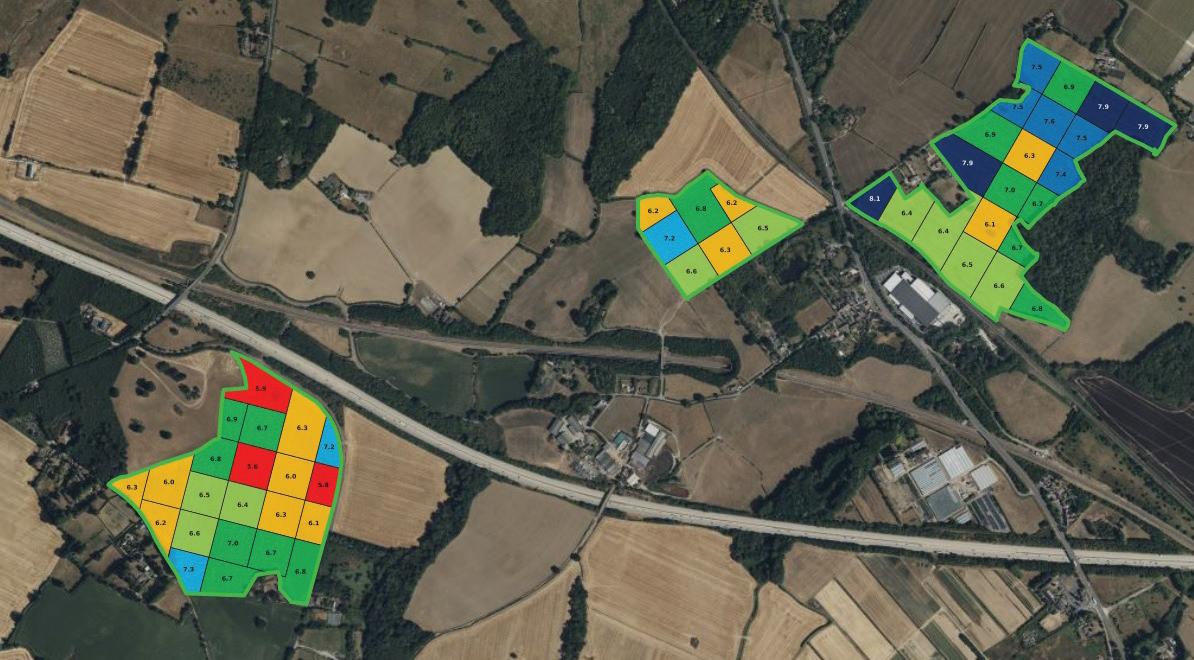

Livestock prices remain at high levels despite softening of beef prices.
It was good to see throughout mid-May that prices remained at strong levels in the livestock markets, with the national shortage of hoggets and lambs being reflected. Numbers are well below 12 months ago, reflecting the difficult autumn and winter and the very wet spring.
Spring lambs came forward in low numbers in May, with vendors stating the lambs were probably four weeks behind where they were this time last year. There was a strong trade for any new season lambs forward, trading well over £200 a head for the best quality and around 480p/kg to 500p/kg liveweight.
It is quite remarkable, considering that 12 months before lambs were trading in the late 300p/kg; an increase of over £40 a head. Let us hope this continues right through the season as hopefully lambs come forward in greater numbers.
Old season lambs continued to be exceptionally highly sought after, with numbers short throughout the country and little indication when this report was being written in mid-May that prices were dropping. Indeed, numbers were dropping faster than price.
Seeing old season lambs trading over £200 a head was superb for


































 GRAHAM ELLIS FRICS FAAV FLAA
GRAHAM ELLIS FRICS FAAV FLAA
For and on behalf of Stanfords T: 01206 842156 E: info@stanfords-colchester.co.uk www.stanfords-colchester.co.uk
the producers, so let us hope the wholesale and retail markets can continue to sell lambs at a return which is beneficial to all.
The ewe trade was also at strong levels, with the Muslim festivals helping this trade and, again, numbers being short. Record prices were being met for cull ewes in the markets. More sheep could certainly be sold in all sections of livestock markets, to the benefit of producers.
The cattle trade did take a slight downward turn as this report was being written, seen particularly at the higher quality end, with retail butchers stating that it was more difficult to sell large quantities of meat at the increased prices. It has, however, to be remembered that the weather continued to be exceptionally poor and the barbecue season has been delayed!
Numbers were still short and it is likely they will remain short, which is at least holding a trade that is sustainable.
Quality beasts are still trading over 300p/kg in the live markets, with the general run of cattle between 260p/kg and 280p/kg. There was a strong trade for manufacturing cattle in the culled markets, which was certainly dearer than 12 months ago, as were the prime cattle. More could certainly be sold to advantage by producers in the livestock markets.
Store cattle trade continued to be strong as would be expected, with numbers tight and yards empty. With lower feed costs, there is some hope that the strong prices paid for store cattle can return, and with the grass growing strongly by mid-May with the slightly better weather coming forward, graziers were looking for cattle as they traditionally do.
The pig market continued to be strong, with numbers generally meeting demand and no carry forward of stock by abattoirs. This is positive and, again, the same comments regarding feed costs apply, helping pig farmers make a return after many years of depression.
Arable crops were growing well as this report was being written. Winter barley has been full on ear and spring barley is at last showing some growth. Potato planting was still behind as the report was being written and it was noted that although the top surface has dried, the subsoil was still very wet and cultivation had to be carried out very carefully.
Is has been hectic here at the Hobbs Parker Auctioneers HQ in the two months since I last wrote in these pages, with a variety of different sales taking place and another busy month in front of us with a full calendar of sales and events.
In the normal livestock sale rings, we have seen good throughput for the spring months and, while numbers have been marginally down on last year, the fantastic prices we are now seeing have certainly made up for that. I have written several pieces on these record prices, and I am sure you are all fed up with me preaching about that, especially if you haven’t got any stock to sell at the moment.
I am quizzed by various customers, daily, as to whether or not prices can stay where they are, if it will last and how long they can “stand” these prices for. In short, I really don’t know the answers any more. The global food market is in a volatile state currently and I’m afraid to say that with a finished sheep selling for £200 in Ashford Livestock Market and legs of lamb in the well-known supermarket chain not even a mile up the road costing £15 over the Easter weekend, it takes some working out!
already been made on the rest of the carcase. Enough on that subject or I’ll never stop. We have held two large farm dispersal sales so far this spring, with two more now in the calendar alongside our own collective sales in the market and at Headcorn (which will now be taking place on Friday 31 June due to poor field conditions)
One of the largest sales we have undertaken for an individual customer was the Bardsley England dispersal sale in April, thought to have been one of the largest dispersal sales of fruit farming equipment seen in recent memory in the South East, if not potentially in the UK.
Almost 800 lots were on offer on the day, and following an 11am start we sold the last lot at 6pm, with a full clearance and prices considerably ahead of many expectations. Over 300 buyers purchased on the day and 850 bidders registered to bid online from all over the UK, Ireland and Europe, with a considerable amount of equipment being purchased by export customers.
 JOHN ROSSITER
JOHN ROSSITER
Reporting on the market at Ashford T: 01233 502222 www.hobbsparker.co.uk
different setting, with almost a back-intime feel at a dispersal sale for one of the remaining thatching straw growers in the UK. Again, live online bidding was vital on the day, with similar successful percentages returned despite the more vintage nature of the items on offer.

In truth it is an intricate marketplace that few truly understand. In our own local butchers’ shops, huge value is placed on legs of lamb and they are viewed as the premium joint of the carcase, but in the middle east they are almost considered to be a by-product and are 3rd choice behind the shoulders and the loins. This in turn allows processors to flood the British marketplace with low-priced, frozen, imported legs as the profits have
Using the online bidding platform Marteye we received bids on over 25% of the lots from online purchasers and sold 15% of the lots to this system. I don’t think I need to explain the necessity of this system in today’s auctions; the figures speak for themselves. Following Covid-19 and its restrictions, we have entered a new era in the business of dispersal sales which we have embraced, and it is showing some excellent results for our vendors.
This was once again demonstrated at Hamden Grange, near Bethersden, in a very
If you feel a dispersal sale may be required in the future for your business, please do not hesitate to contact me to discuss your options. Total discretion will be guaranteed, as I am aware how difficult it is to come to a decision to ‘sell up’ after a lifetime in farming. Unfortunately, it is the only solution for some people, and we pride ourselves on making it as smooth and stress free as possible, while achieving the very best prices.


This is the time of year when one is confronted with just how quickly the calendar moves on around us, and of the cyclical nature of sheep production. Even in the South East corner of the country, we are at the point when some flocks are just getting themselves sorted in the aftermath of lambing and getting lambs going at grass, while others are considering weaning. The latter is considered to be the end of one production year, inevitably signaling the start of the next; a time when once ewes have dried off after weaning we start the process of making up and preparing the flock for tupping and next year’s lambing. It’s quite a daunting prospect to consider that a lot of what we do with our ewes over the summer months will determine the flock lambing performance in 2025.
We all go through the routine stuff, assessing the suitability of ewes for future breeding, selecting culls, sorting replacements, body condition scoring etc., but how much thought do we give to the quality of the individual ewes in our breeding flock? For the commercial producer running a flock of hybrid ewes, Mules etc., there is little control apart from buying the best available (within budget), but purchases will be made on the basis of very limited criteria, largely visual assessment plus, possibly, buying from a known and trusted breeder.
For self-replacing flocks, a growing trend due to the significant advantages that accrue in terms of higher health status and the like, there is an enormous opportunity to exercise a greater degree of control over replacement quality and, in the longer term, flock performance. It is a process that does require a bit of thought, planning and recording. It is not particularly onerous but is a rather more efficient and effective approach than simply picking out the best looking, biggest etc. from a group of home reared shearlings. The use of purely subjective criteria certainly does not afford any meaningful assessment of future performance.
ALAN WEST Sheep farmer

There will generally, although sadly not always, be considerable attention and time devoted to sourcing and selecting or purchasing rams for the flock, but not the same level of consideration to the ewes, something that, in my view, does a great injustice to what is the essence of any flock and certainly of a self-replacing ewe flock. It is the ewes that provide the continuity. Rams come and go, but many purebred and pedigree flocks will have ewe lines that go back for generations; they are lines that have been bred for a particular environment and production system and which should provide the consistency. All we need to be able to do is identify reasonably objectively the best performers with some degree of accuracy.
Regardless of whether our ewes are pedigree, pure-bred or home-reared commercial crossbreds, we all have ready access to the resources required to make more effective selection decisions. We are all obliged to identify our ewes, so why not make use of it?
It is relatively simple process linking lambs to ewes; at lambing time we all know which lambs belong to which ewe by the simple expedient of tagging lambs at or soon after birth, so we can generate a link that will last for their lifetime and one that enables us to link objective measurements of the dam to her progeny.
Collecting some fairly basic data can provide a useful indication of what a ewe lamb is able to inherit from her mum and indication of her potential future performance; in general, the best ewes are likely to pass on the genetics required to produce the best replacements, although as with all things sheep, this is not guaranteed. By simply weighing lambs at or soon after birth, we have a starting point; people will say that they don’t have time at lambing, but this is a nonsense; including weighing (and recording) into routine lambing treatments adds a matter of seconds per lamb and only
requires a set of handheld weigh scales and a bucket. I have always weighed lambs as they are walked up to the mothering pens; weigh, dip navels, into the pen with mum and record weights. By weighing the largest and ram lambs first it is relatively easy to ensure that weights can then be related to tags.
Once in possession of a start weight, subsequent weight recordings may be used to measure growth rates; done within the first eight to ten weeks of life, this also provides a useful indication of mum’s genetic capacity for milk production. So with two weight records we have an indication of the lamb’s early growth potential and of the ewe’s milking and rearing ability; this is something that can easily be ranked by simply looking at total litter weight (singles, twins etc.) reared to eight weeks as a percentage of the ewe’s body weight at weaning. This, together with lambing scores, ewe health records etc. will contribute to meaningful and objective criteria to aid in the selection of better quality replacements. The biggest and the best looking are not always the ideal replacements; often it’s the contrary – singles, for example, are likely to be the biggest, even at 15 to 18 months.
OK, it all takes time, but for the smaller flock it can easily be done manually and for the larger flock, if applied in conjunction with a good flock management programme and the use of electronic weighing and record systems, is even less onerous; it is time that should be regarded as an investment in future flock quality and performance. Better quality replacements generally provide for a better performing flock through improved output, reduced times to finishing, longer flock life, reduced replacement costs, reduced ewe depreciation and lower vet’s bills, all of which should contribute significantly to an enhanced bottom line, simply by giving a little more thought to our ewes.


www.cliffefarm.co.uk
Cliffe Veterinary Group
T: 01273 473232
E: leonille.griffiths@cliffevets.co.uk

Spring has finally arrived, better late than never. We have been very busy with the usual lambing and calving calls. There has been a couple of Caesarean sections due to big calves, but luckily not many dramas. The weather has been the main topic of conversation on farm as the rain hit just as everyone started lambing outside; typical.
The number of coccidia parasites exploded on affected farms due to the wet ground, so we found some extraordinary counts on faecal examination. The highest count we have found so far this year was almost 600,000 oocysts (eggs) per gram of faeces. We normally see counts of around 1,000 to 2,000 oocysts per gram. The lambs recovered very quickly after treatment and are now thriving.
We have seen some herds and flocks affected by Schmallenburg virus causing more empty dams than usual. We are fortunate that foetal malformations have been uncommon. The virus would have been circulating in the midge population last autumn, when the rams and bulls were in. The affected animals are now immune, causing the disease to appear every four to five years as these animals age out of the flock or herd.
We are keeping a close eye on the Bluetongue virus situation as another incursion is likely this summer. Good news is that a vaccine is now available to use in Europe and so hopefully it will not be long before it is available to us. Midges carry Bluetongue virus and are unable to fly in a light wind and so exposed, high ground is the lowest risk pasture. I would advise saving these fields to graze late in the summer and early autumn when the midges are likely to be at their worst.
We have seen a few flocks affected by tick-related disease. One interesting case was a lamb that could not use its back legs at four weeks old and on post-mortem examination was found to have an abscess in the spine. Usually, these spinal abscesses are caused by an infection acquired at birth that spreads around the body. When the sample was cultured at the lab, this case turned out to be Staph. Aureus, a bacteria spread by ticks. This is called tick pyaemia and is uncommon.
Breeding ewes, especially bought-in replacements, should be exposed to ground that has a lot of ticks before they go to the ram. This allows the ewes to acquire immunity to diseases that the ticks may carry before breeding.
I hope you all can start silaging soon as summer gets underway. I am thoroughly looking forward to days out on farm in the sun and my subsequent farmer tan lines!

MUCH MORE THAN JUST GARLIC!
Reduce fly irritation at grass with Crystalyx Garlyx, containing concentrated garlic extract (5x more potent than pure dried garlic), offering natural protection against biting insects
Produces an invisible screen over the animals body to help repel insects, reducing the risk of infection from bites
Balances nutrient deficiencies in summer grass
Boosts forage digestibility by 10% and dry matter intake by up to 15%




Also available, Crystalyx Organyx Garlic, specifically for organic farming systems






















Whinge, whinge, whinge; that’s all we ever seem to do, but with farmers’ confidence at an all-time low and more than 40% of farmers considering their future in farming (according to national statistics), The NFU is now campaigning for the basic payments phase-out to be halted in the wake of the ongoing crisis.
Arable, mixed farming and livestock appear to be at the bottom of the scale. With confidence at its lowest ebb for many years, it seems to be undermining a willingness to reinvest, which in turn is damaging food security. Farming is a volatile market at the moment, global markets have weakened and the sector is having to deal with the basic payments phase out, climate change and an immigration policy that is not fit for purpose.
Add into the mix high interest rates, increased working capital requirements, environmental agency compliance and many more issues and there is a total lack of confidence among most farmers. Many farmers are struggling with day-to-day cash flow. Farmers in the main are “asset rich but cash poor”. Surely the Government needs to act now.
The top 10 agricultural producing countries in the world are China, USA, Brazil, India, Russia, France, Mexico, Japan, Germany and Turkey. These countries all produce a wide range of agricultural products, including cereals, fruits, vegetables, meat, dairy and seafood. Their agricultural sectors are crucial for their economies and they play a huge


role in the global agricultural economy by exporting their products to countries around the world.
Each country has its own strengths and weaknesses and specialities in agriculture. For example, Japan has limited arable but places a huge focus on high value crops like rice, vegetables and fruits. Turkey is a large agricultural producer and is known for its production of grains, fruits, vegetables and livestock products.
Meanwhile here in the UK we are encouraged to grow wild flower meadows and place a large proportion of our land in various conservation schemes. In Wales, I believe it is now compulsory to include 10% of land in schemes from 2026. Large amounts of grade 1 arable land have been placed in various schemes around the country, thus removing the land from food production. Five years of guaranteed revenue from the scheme is more appealing than employing staff, running tractors etc. Time is of the essence and the Government needs to act now to preserve the country’s food security. Will farmers reinvest after five years? I doubt it.






Back on the farm and Monty had a few barren ewes that he decided to sell through the market. On the designated day a few unexpected events occurred in the dairy and we had to postpone the trip. When walking past the field in the afternoon, we spotted a newborn lamb; no signs from the ewe (she scanned empty) but all appeared healthy and bonny. A lovely surprise for Teddy when he returned from school.
First cut silage is now complete and grass is regrowing at an amazing pace. Second cut won’t be far behind. The combine is serviced and ready to go; all we need is some more sun. The year seems to be flying past. We had the most amazing views of the Northern Lights in the middle of May (who needs a trip to Iceland when we have them in the back garden?)
Until next time, stay safe and happy mowing!

In some parts of the world, resistance to wormers has reached a point where sheep farming is no longer sustainable, and widespread resistance has been detected on many farms in the UK. Maintaining effective worm control is vital, and by changing certain practices we can preserve the effectiveness of existing wormer groups for the future.
There is only a handful of commonly used wormer groups when it comes to active ingredients. These are:
• White (1-BZ) – resistance found on most farms
• Yellow (2-LV) – less resistance than to white but increasing rapidly
• Clear (3-ML) – resistance growing, very important to protect effectiveness of group
• Orange (4-AD) – limited reports of resistance, use following SCOPS guidance
• Purple (5-SI) – no reported resistance, use following SCOPS guidance
No two farms are the same, so the worming plan a neighbour uses may not be effective for your worm population, grazing strategy or resistance profile. There are no new drugs on the horizon, but one guaranteed way to promote resistance within your worm population is always to use the same class of wormer at the same time each year.
When it comes to worming, use as little product as possible but as much as necessary to protect the health and productivity of livestock.
By Emily Collins-Wingate BVMSci MRCVS.There are two methods of monitoring stock to ensure wormers are only used when they are required. Regular faecal egg counts (FECs) will identify upwards trends in worm burden and most farmers who use FECs use less wormers without any loss in performance.
Targeted selective treatment (TST) makes use of daily liveweight gains to identify animals not growing as they should be. TST can be an early warning system before clinical signs such as scouring are seen.
Mature, healthy sheep have immunity to most worms so require minimal treatments. It is estimated that millions of pounds worth of wormers are used ineffectively each year; dosing healthy adult ewes wastes time and money and delivers no benefit.
Grazing management is an important method of reducing the worm burden stock are exposed to. Lambs are the primary concern, so making use of newer leys or forage crops can reduce their exposure. Rotational grazing can also reduce the worm challenge, while herbal leys and mixed swards have natural anti-parasitic properties and structures that are more challenging for larvae to climb.
Rotating products through the season avoids overuse of one wormer class. Using group 4 and/or 5 products as a late season drench or quarantine treatment will also help reduce resistance.
Avoiding overuse of wormers is key, but there are other ways to prevent resistance developing.
If you would like to discuss anything covered in this article contact your local Westpoint practice
Westpoint Horsham T: 01306 628086
Westpoint Ashford T: 01306 628208
Westpoint Sevenoaks T: 01959 564383
Westpoint Winchester T: 01962 779593
Westpoint Chelmsford T: 01306 628489
E: info@westpointfarmvets.co.uk www.westpointfarmvets.co.uk
Exposing worms to a partial dose of wormer promotes resistance within the worm population. Weigh stock before worming and always dose to the heaviest weight. Toxicity due to overdosing with wormers is a risk, particularly with yellow wormers, so don’t intentionally overdose to avoid weighing. Check drenching equipment is in good working order and calibrate the dose with a syringe or measuring cylinder.
Checking for resistance on your farm using FECs is simple and cheap, and will enable you to create a specific plan to ensure worms are controlled in the most economical and appropriate way.
FECs should also be used following a worming treatment to check that it has been effective. The timing of post-treatment FECs varies depending on the product used:
• Yellow drenches seven-days post-treatment
• White, clear and orange 14-days posttreatment.
‘Drench checks’ should ideally be done every time a wormer is used, as an early warning system for resistance. We may not see resistance as a clinical issue (lambs scouring or not gaining weight) until at least 50% of the worm population is resistant. At this point resistance is very difficult to reverse, so prevention is the priority. There is Animal Health and Welfare Pathway funding available to facilitate drench checks in sheep.
New sheep arriving on farm, or those returning from grazing away, should be treated on arrival to remove any resistant worms. Quarantine treatments generally make use of group 4 or 5 products.
Refugia is the population of worms not exposed to a wormer when a dose is given, so either those in untreated animals or larvae on the pasture. This is important as it means any resistant worms are diluted into a larger population, slowing the increase of resistant worms.
• Ensure at least 10% of the bigger, fitter, lambs per field or group are left untreated
• Avoid treating when worm burdens are low
• Never ‘dose and move’ sheep as this promotes resistance. Either leave sheep on dirty pasture for four to seven days after worming, or move first and dose later.
Hadlow College marked the arrival of spring with another successful lambing weekend.
More than 10,000 people flocked to Kent’s only rural and land-based college to see an abundance of lambs gambolling around the college’s beautiful fields, visit the lambing sheds to see a newborn enter the world and learn much more about what the college offers at the two-day event in April.
Tania Bucknell, farm manager at Hadlow, explained: “While our flock is a commercial enterprise at the college, they are very much part of the learning experience at Hadlow. The students are involved with lambing our ewes and the aftercare of the lamb and its mum, and are then involved in the flock's entire management programme throughout the year.”
“For me, seeing our visitors smile when they see a lamb is just fantastic, a real privilege. At the end of lambing, I am bereft. Although it is exhausting, it is the most fulfilling and amazing job in the world.”
There was also the chance to see the many other animals the college looks after, which range from pygmy goats to meerkats, and visit the National Centre for Reptile Welfare, which provides refuge and care for over 1,000 unwanted and vulnerable reptiles and amphibians.
Much more was on offer, including tractor trailer rides, a birds of prey display, archery, fun-fair rides and stalls, arts and crafts events and plenty of food and drink stalls.
Also stars of the show over the weekend were the college’s students, as Chris Lydon,
vice principal, explained: “An event like this is fantastic to bring the community into the college, as we open our doors so everyone can see what we do.
“We are Kent’s only land-based college, and we offer a wide range of courses such as agricultural, equine, animal management, fisheries, and horticulture and floristry, and the lambing weekend is about showcasing our students and demonstrating how great they are and what they do throughout the year.”
Hadlow College is set in the beautiful surroundings of a large managed estate that includes more than 265 acres of prime arable land, woodland, sports facilities, a natural river, three commercial farms, established show gardens and horticultural glasshouses, lakes and other natural habitats.
To find out more, come to one of the college’s upcoming open events where there will be the opportunity to speak to industry trained lecturers and current students and explore its top-class facilities.
They take place on:
• Wednesday 5 June, from 3pm to 7pm
• Saturday 9 November, from 10am to 1pm.
There will also be a higher education open morning on Thursday 4 July, from 10am to 12 noon, for students looking to join the college in September 2025. As well as the opportunity to speak to staff and students, there will be the chance to see the higher education facilities and tour the residential accommodation.







Following a wet spring which delayed turnout by a number of weeks, James Hastings-Molyneux, UFAC business manager for the Midlands and South East, has stressed the importance of keeping cows on track.
“Normally at this time of year we would be looking at butterfats, ensuring a smooth transition to spring grazing, but we are also facing the challenge of a lack of energy,” he said.
Early grazing data highlights that energy is limited for grazing animals, with milk yield from grazing (MYFG) values continuing to fall, which could be problematic for spring calving herds turning fresh cows out. With early grass having a very low dry matter content this year, and energy levels lower than usual, dry matter intakes will also be limited.
A family-owned business and Southern Farmers supplier, UFAC-UK manufactures specialist energy, protein and omega 3 supplements, with particular expertise in the use of oils, fats, amino acids and liquid sugars. To help support nutrition at spring turnout, UFAC has created specialist balanced fatty acid supplements: For butterfat production, James recommends Buta-Cup Extra. With
75% C16 fat coming from both sustainably sourced palm oils and fats from vegetable sources to support butterfat production, Buta-Cup Extra contains three times the energy content of carbohydrate-based feeds such as cereals and beet pulp.
“It can be fed with no risk of acidosis, and the inclusion of glycerine has a direct effect on fat digestion by the cow, meaning more of the energy is used and less wasted. Glycerine is also an effective preservative, helping improve TMR preservatives,” said James.
To provide additional energy, James suggests feeding Envirolac, which is designed to increase dietary energy density (with 29.8ME/kg DM).
“Envirolac is the solution for dairy farmers conscious of their environmental sustainability, as it is proven to increase milk yields and quality while offering a lower carbon footprint than palm oil-based supplements,” James explained.
“It helps optimise rumen fermentation and prime liver function in order to increase milk yield and constituents and improve cow health and fertility.”
UFAC products are now available from Southern Farmers. Speak to the purchasing team.

Looking
outside the patch sometimes helps one recalibrate and learn, even from the poorest of countries. Mike Kettlewell takes readers on a quick tour of Malawi to see our own agricultural history compressed over decades.
Malawi sits at the southern end of the great African rift valley and borders the second largest rift lake, 350 miles long and 47 miles wide at its widest. This country, the warm heart of Africa, was the place of my childhood and of my father’s career in tropical agriculture.
The land varies in altitude from 100m to 2,500m above sea level, creating a varied and beautiful terrain like parts of the UK. The soils, however, are mostly volcanic and acidic. Rains are seasonal, with seven months of drought from April to November causing widespread hunger.
soils is powerfully evocative.

Typical of the tropics, annual rainfall is heavy, varying between 30 and 100 inches, so there is considerable risk of serious erosion and seasonal flooding. The drumming of rain on tin roofs and the scent of rain on parched
Like Britain, Malawi has had a colourful past, with migration of peoples from West Africa, around the time of the Roman conquest of Britain, pushing the hunter-gatherer San residents southwards. The African immigrants settled in clans or tribes, some of whom traded their brethren with Arabs as slaves.

Europeans were recent and transient administrators. The society was, and is, matrilineal, with extended families living in scattered hamlets within a wider tribal area. Unlike Britain, husbands are incomers, while women remain in the family group. Land was held in common and usage inherited through the female line, while the tribal head was male.




British colonial history in Malawi was short, limited European settlement and ended in 1964. Doctor Banda was the first president of modern Malawi and, like many of our own royal forebears, became despotic, plundered the state coffers and created a small wealthy elite which busily appropriated common lands, displacing smallholders and blurring tribal identity in a way reminiscent of our enclosures.
Farming was traditionally of the ‘slash and burn’ style involving an area of open woodland during the dry season. Wood was harvested for cooking, ash fertilised the soils, and crops were planted on small mounds at the onset of the rains. This was repeated on an extended rotation and the regenerated woodland provided wild fruits, edible plants and a variety of protein sources. Women still do much of the farming and gathering while men build, hunt, fish or work away from home.
The population has quadrupled in 70 years and this has broken the extended sustainable rotation, putting enormous pressure on thin soils. The colonial government encouraged contour cultivation with bunding to retain water and reduce erosion, while protecting steeper hillsides from cultivation.
Modern fertiliser and pesticides were encouraged to increase yields, but the expanded population has resulted in a loss of wild food sources, fuel and natural soil

regeneration. Economic yields are now difficult to achieve.
Smallholders cultivating fewer than five hectares and increasingly unable to buy expensive inputs produce most of the food. As in the UK, regenerative methods are now essential and actively promoted to retain more water, stop erosion, restore soil structure, sequester carbon and increase nutrient retention.
This regenerative approach starts with a discouraging amount of hard graft to dig deep and break the hardpan layer. Vegetable waste is laid in the base before returning the soil to create partially raised beds, with channels between them to hold water, facilitating percolation. Tree planting for food and fuel is also encouraged, alongside the composting of human and animal waste. Crop residues are left after harvest to cover the soil and be incorporated.
We see in Malawi our own agricultural history compressed into decades, which sharpens the focus on our pressing problems and how they arose. They are also man made and exacerbated by a growing population. Land is finite and needs the best care from us all. Malawi is a beautiful country with delightful people and spectacular wildlife, now concentrated in reserves. A visit sharpens domestic perspectives.





Call us today or visit our website: 01227 763939 furleypage.co.uk

‘Force majeure’ provisions could help growers who are unable to meet their contractual obligations because of the weather, as Amy Peacey, partner and commercial lawyer with national law firm Clarke Willmott LLP, explains.
So far, 2024 has been the year of rain. For the UK, the 18 months to March 2024 ranks as the fourth wettest on record. The NFU has recently indicated that harvest prospects are predicted to be lower than average for many growers in England. Some businesses will be concerned that they will not be able to fulfil their contractual obligations as a result.
Expert lawyers as well as NFU representatives are warning cereal businesses, which are already enduring significant reductions in income, to stay informed about how any shortfalls will be addressed with buyers.
Most commercial contracts contain force majeure provisions which may help. The purpose of a force majeure clause is to excuse a party from performance of their contractual obligations following the occurrence of an event which is beyond that party’s reasonable control, such as adverse weather conditions. The force majeure event will either prevent or sometimes just hinder or delay the performance of the contractual obligation.
The scope, operation and effect of a force majeure clause will depend on the drafting of the clause. The clause will determine whether the agreement continues, is suspended or is terminated on the occurrence of the force majeure event.
Every contract will have its own definition of force majeure.
Some definitions will include an exhaustive list of events and/or circumstances which are considered to be beyond a party’s reasonable control. These exhaustive lists may include reference to adverse weather and/or flooding. Other contracts may include a more general definition such as “any event or circumstance outside of the party’s reasonable control”.
Whether or not adverse weather conditions will be caught by the definition will be a matter of interpretation. The full terms of the contract, along with the circumstances of the situation, will need to be assessed to determine whether the grower can rely on the force majeure provisions or not.
Some force majeure clauses include a qualification that the event was not reasonably foreseeable or would have been impossible to plan for or avoid. The inclusion of this wording clearly affects the ability to rely on the clause.
A grower who is seeking to rely on the force majeure clause will need to show that the adverse weather is the cause of your failure to fulfil your contractual obligations.
If the contract is silent on force majeure, they will need to look to the other terms of the contract or to the common law to determine if there is an excuse for non-performance.
Any businesses concerned that they may be unable to fulfil contractual obligations as a result of the weather can contact Amy Peacey at amy.peacey@clarkewillmott.com She will be able to review contracts and the associated circumstances and advise accordingly.
There’s much to consider when planning for the future, and the law in this area doesn’t stand still. Brachers’ private client team brings you an update on the latest legal developments.
Now that we are living longer, more individuals are, sensibly, incorporating lasting powers of attorney (LPAs) into their estate planning.
For the uninitiated, a power of attorney is a registered legal document that allows another person to make decisions on your behalf in relation to your property and financial affairs should you (‘the donor’) require help or become unable to make such decisions yourself in the future. You can also nominate those you would wish to look after your health and welfare should you lose mental capacity in the future. For many, it brings comfort to know that someone they trust can ‘step into their shoes’ to protect their interests.
However, the rise in LPAs has led to muchneeded legal reform. Data from a recent consultation by the Ministry of Justice (MOJ) and Office of the Public Guardian (OPG) showed that the number of registered LPAs has rocketed in recent years to over six million. As a consequence, the outdated paper-based process needed a digital revamp to help speed up registrations.
The new Powers of Attorney Act 2023 aims to simplify the LPA process by moving to a predominantly digital service, although paper-
based registrations will still be an option. The reforms also aim to make LPAs more affordable while protecting individuals against fraud and abuse.
The digitalisation of LPAs promises a number of benefits, including:
• improving security: the OPG will verify the identities of parties during registration
• passing the burden of notification of the relevant parties from the donor to the OPG
• creating a single source of truth by using a digital LPA that can be updated by the OPG in real time, for example where an attorney is removed from an LPA due to abuse
• improving efficiency by reducing processing times and allowing errors on LPAs to be fixed online as part of the process, rather than having to submit a new LPA
• enabling the OPG to operate a triage system for certain types of objection and expanding the group of people who can raise an objection to include third parties who are not named in the LPA.
The next step will be for the MOJ and OPG to implement the legal changes and test the new
MARY RIMMER Private Client Partner T: 01622 655296
E: MaryRimmer@brachers.co.uk www.brachers.co.uk

processes. We will follow developments keenly while continuing to help clients navigate the existing landscape.
Since October 2020, the rules around trust registration have changed and require any trust that is still being administered two years from the date of death to be registered with HMRC. If you are in the process of administering an estate and are either approaching or have passed the two-year period, any trusts within the estate will need to be added to the HMRC Trust Register. If you are uncertain whether this applies to you or simply need assistance registering a trust, our dedicated trust team is here to help.
While the law around Wills remains largely unchanged, it is important to consider whether or not you need to update your Will. Have you had any significant family life or financial changes since making your last Will, for example a recent birth or bereavement in your family, or perhaps an expansion of your agricultural land and assets? Each client’s circumstances are different, which is why we would recommend seeking legal advice on any potential changes.
Written by Mary Rimmer and Rachael Bates.


L a n d & P r o p e r t y E x p e r t s t

L E N H A M | K E N T
5 - b e d r o o m d e t a c h e d f a r m h o u s e w i t h l a n d s c a p e d
g a r d e n s a n d g r o u n d s o f 0 7 5 a c r e s
R a n g e o f g e n e r a l p u r p o s e a n c i l l a r y b u i l d i n g s a n d
t e n n i s c o u r t
S i g n i f i c a n t r a n g e o f a g r i c u l t u r a l b u i l d i n g s w i t h
p o t e n t i a l f o r r e s i d e n t i a l c o n v e r s i o n ( S T P P )
I n a l l a p p r o x i m a t e l y 1 3 2 7 a c r e s
G u i d e P r i c e : £ 1 , 9 9 5 , 0 0 0


C H A T T E N D E N | K E N T
L o t 1 : D e t a c h e d h o u s e , r a n g e o f o u t b u i l d i n g s a n d
l a n d - 7 7 1 a c r e s G u i d e P r i c e : £ 1 , 4 5 0 , 0 0 0
L o t 2 : F o r m e r T r a n s m i s s i o n S t a t i o n , l a n d &
w o o d l a n d w i t h d e v e l o p m e n t p o t e n t i a l - 1 2 1 8 a c r e s
G u i d e P r i c e : £ 3 0 0 , 0 0 0
L o t 3 : F o r m e r a r m y c a m p s i t e w i t h w o o d l a n d1 9 2 9 a c r e s
G u i d e P r i c e : £ 2 5 0 , 0 0 0
G u i d e P r i c e A s A W h o l e : £ 2 , 0 0 0 , 0 0 0

F R I T T E N D E N | K E N T
A 9 0 a c r e t o p f r u i t f a r m
6 0 a c r e s o f a p p l e a n d p e a r o r c h a r d s w i t h t h e
b a l a n c e w o o d l a n d a n d r e s e r v o i r
C e n t r a l l y l o c a t e d r a n g e o f b u i l d i n g s w i t h C l a s s Q
r e s i d e n t i a l c o n s e n t f o r 3 d w e l l i n g s
G u i d e P r i c e : £ 1 , 2 5 0 , 0 0 0

H I G H H A L D E N | K E N T
3 7 a c r e s o f m i x e d b r o a d l e a f w o o d l a n d t o t h e s o u t h
o f H i g h H a l d e n a n d n o r t h - e a s t o f T e n t e r d e n .
A m i x t u r e o f s e a s o n a l w i l d f l o w e r s
B i o d i v e r s i t y o p p o r t u n i t i e s .
G u i d e P r i c e : £ 2 4 0 , 0 0 0
w w w b t f p a r t n e r s h i p c o u k c h a l l o c k @ b t f p a r t n e r s h i p c o u k


We know that your estate is more than just a business. Whether you require full estate management, strategic advice or one-off consultancy, our expert team has you covered. Contact us today!

A high specification equestrian facility in the North Wessex Downs, close to Andover, Hampshire, has come to the market through Savills.
Lower Doiley Farm and No 4 Lower Doiley are accessed by separate points on Doiley Bottom Lane, a quiet country lane linking Lower Doiley to the villages of Stoke and Hurstbourne Tarrant.
Lower Doiley Farm provides a generously sized, modern family home, which was renovated in 2005, alongside high
specification equestrian facilities centred around an attractive courtyard, with 18 stables, tack and feed storage facilities, indoor and outdoor manège, horse walker, lunge pen, machinery store, kitchenette and a changing area. The land extends to 34 acres and is separated into paddocks for grazing, with post and rail fencing and water troughs.
The house, land and equestrian facilities are currently let under a single tenancy agreement which expires in May next year.
In addition, 4 Lower Doiley Cottage, a two
bedroom cottage, is let on an assured shorthold tenancy.
Geoff Jones, director, Savills head of rural agency in the south, said: “Lower Doiley Farm is a high specification equestrian facility with generously sized farmhouse, separate cottage and 34 acres in the North Wessex Downs. The property has a truly rural feel, while also benefitting from excellent road and rail links.”
Lower Doiley Farm is offered for sale as a whole or in two lots, with a guide price of £3,100,000 for the whole.




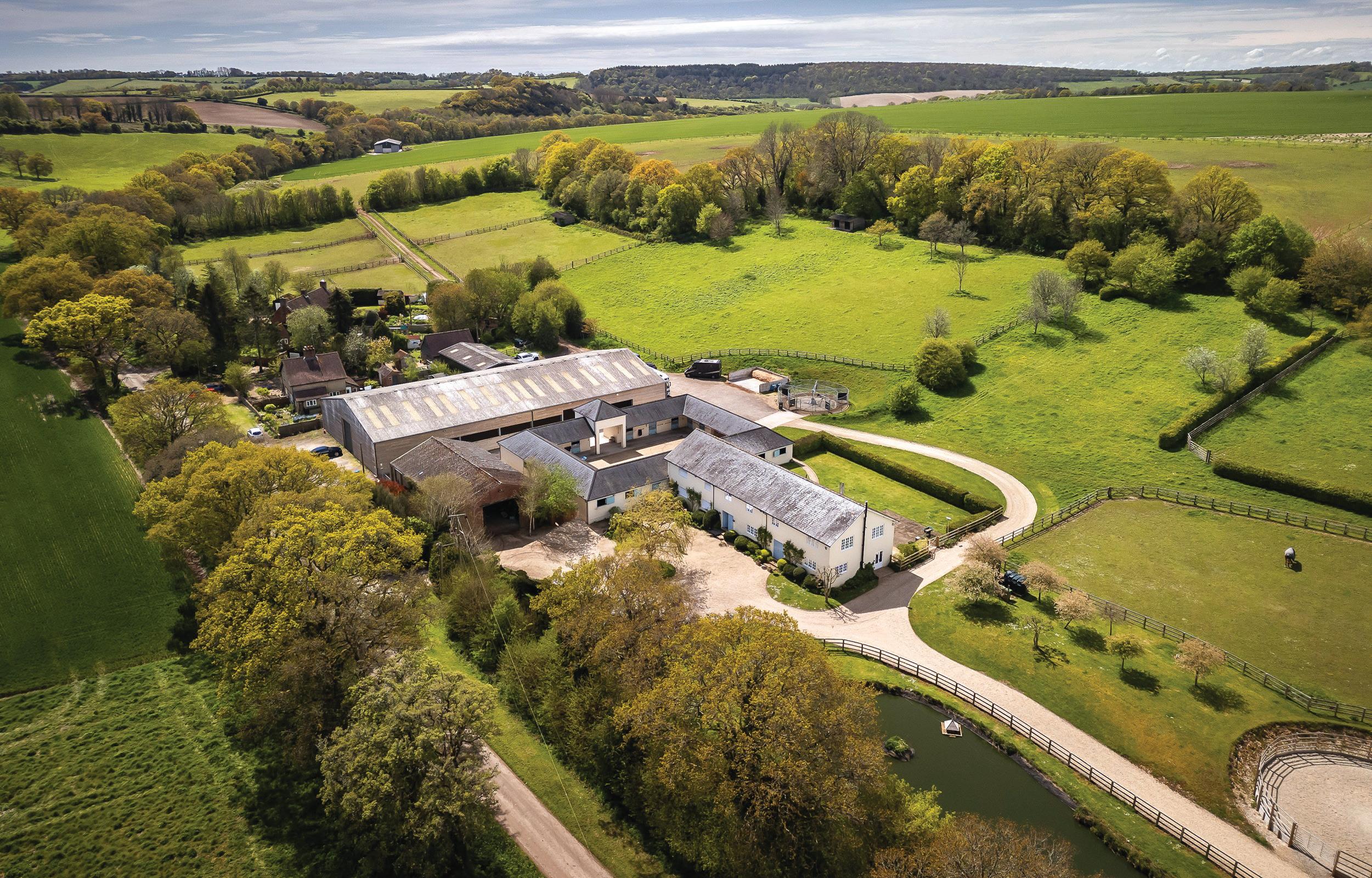















Class Q rules



✓ A greater number of units now permitted;
✓ A greater cumulative floor area now allowed;
✓ A greater range of buildings now considered We have obtained approval for over 230 units using Class Q. Contact Bloomfields today and give yourself a greater chance of success.









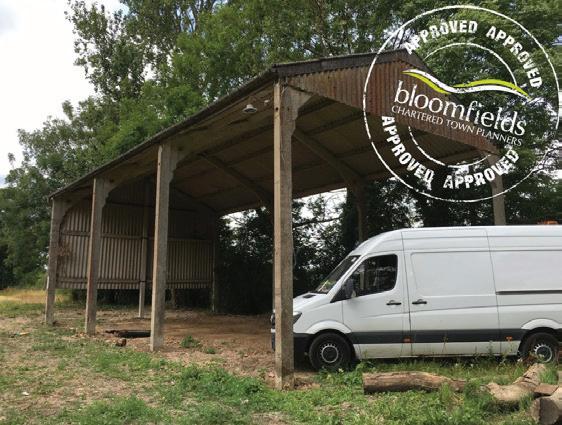



More detail has been issued on the much anticipated ‘summer’ release of the Sustainable Farming Incentive. There is now a great deal of detail to consider which we would be pleased to discuss with you. The headlines are as follows:
■ Expanded SFI will be available to applicants from 22nd July 2024.
■ New applicants will be able to apply for the first time i.e. those that did not apply for BPS in 2023 will now be eligible.
■ The number of Actions will increase from 22 to 102 Actions and include 20 new Actions and 50 simplified Actions merged from Countryside Stewardship Mid Tier.
■ A further SFI release is being planned for later in the year, to include payments for educational access.
At the time of writing, we do not have detailed guidance setting out the land management requirements for the new Actions, but the following are examples of some of the new Actions we expect to be included:
No-till farming
Variable rate
£73 per ha

No-till farming techniques to establish crops, minimising soil disturbance.
Precision farming variable rate technology application of £27 per ha used to apply nutrients to match the nutrient nutrients needs of crops.
Camera or remote
Automated camera-guided or remote sensing sensor guided £43 per ha technology to precisely target application herbicide spraying of contact herbicides.
Agroforestry £595 per ha In-field agroforestry system so there is a combination of either trees and arable, horticultural crops, or trees and grassland for forage and livestock.
Footpath access £77 per 100m
Open access £92 per ha
Provide and maintain new permissive footpaths to the public.
Provide and maintain permissive open access to the public on areas of land.
Other noteworthy matters in the press release:
■ Countryside Stewardship Higher Tier will be open for applications from the ‘winter’, with agreements starting 1st January 2025 and interested applicants will be able to start working with Natural England and/or the Forestry Commission from the ‘summer’
■ New digital tool launched to signpost farmers to funding opportunities www.gov.uk/find-funding-for-land-or-farms



And to recap the announcements from earlier in the year and the key attributes of an SFI Agreement:
Agreements are three years and payments are made quarterly in arrears.
At each 12 month anniversary, the agreement can be varied to add more Actions/Land.
Management payment of £40 per hectare for fist 50 hectares in year 1, reducing to £20 per hectare from year 2.
No minimum area of land required.
25% cap on land entered into Actions that take the land out of production.

BTF Partnership has launched for sale Delmonden Farm near Hawkhurst in the county of Kent. This is an accessible and versatile High Weald country estate within the Cranbrook School catchment area with a six-bedroom farmhouse, annexe, landscaped gardens and grounds, swimming pool, tennis court, range of agricultural and commercial buildings with potential, equestrian facilities and land extending in total to 81.72 acres.
The Grade II listed property is surrounded by its own land and buildings and has a long history dating back to the 16th century and Tudor origins.
Accessed via a long driveway well off the road, the farmhouse has an entrance hall, drawing room, study, dining room, boot room, rear entrance hall, kitchen/breakfast room, w/c, utility room, cellar and a ground floor annexe which can be self-contained.
Upstairs there are four large double bedrooms, all with built-in storage, a family bathroom and a w/c. On the second floor there are two further double bedrooms.
The annexe can be accessed via the farmhouse or via its own front door, and has an entrance hall, sitting room, bathroom and two double bedrooms. The farmhouse utility room could be utilised as a kitchen if it were to be fully self-contained.
Outside there are landscaped gardens and ponds with a jetty for fishing. Beyond the lawns is a heated swimming pool, terrace and pool house which is now in need of modernisation, and beyond a fully fenced tennis court.
The farm, equestrian and commercial buildings have potential for either commercial or residential planning permission as there is lapsed Class PA planning for nine residential units. The buildings extend to over 13,500ft2 and have could be let out tomorrow for income if required. In addition, there is a mixed surface menage measuring 60m x 25m.
The land, which is classified as grade 3 and extends to 77.06 acres, is mainly to the north and west of the farmhouse and buildings and is laid to grass in a variety of enclosures and has been used by the Pony Club for cross country trials. There is a single veteran orchard with productive trees, plus ponds and woodland.
Alex Cornwallis at BTF Partnership commented: “This is an excellent country estate in a rural but accessible location with a range of leisure facilities and buildings with potential for residential or commercial income. This is perfect for a buyer looking to put their stamp on a large family farmhouse with flexible accommodation and well located with Hawkhurst two miles away, Cranbrook five miles and Tunbridge Wells only 14 miles.”



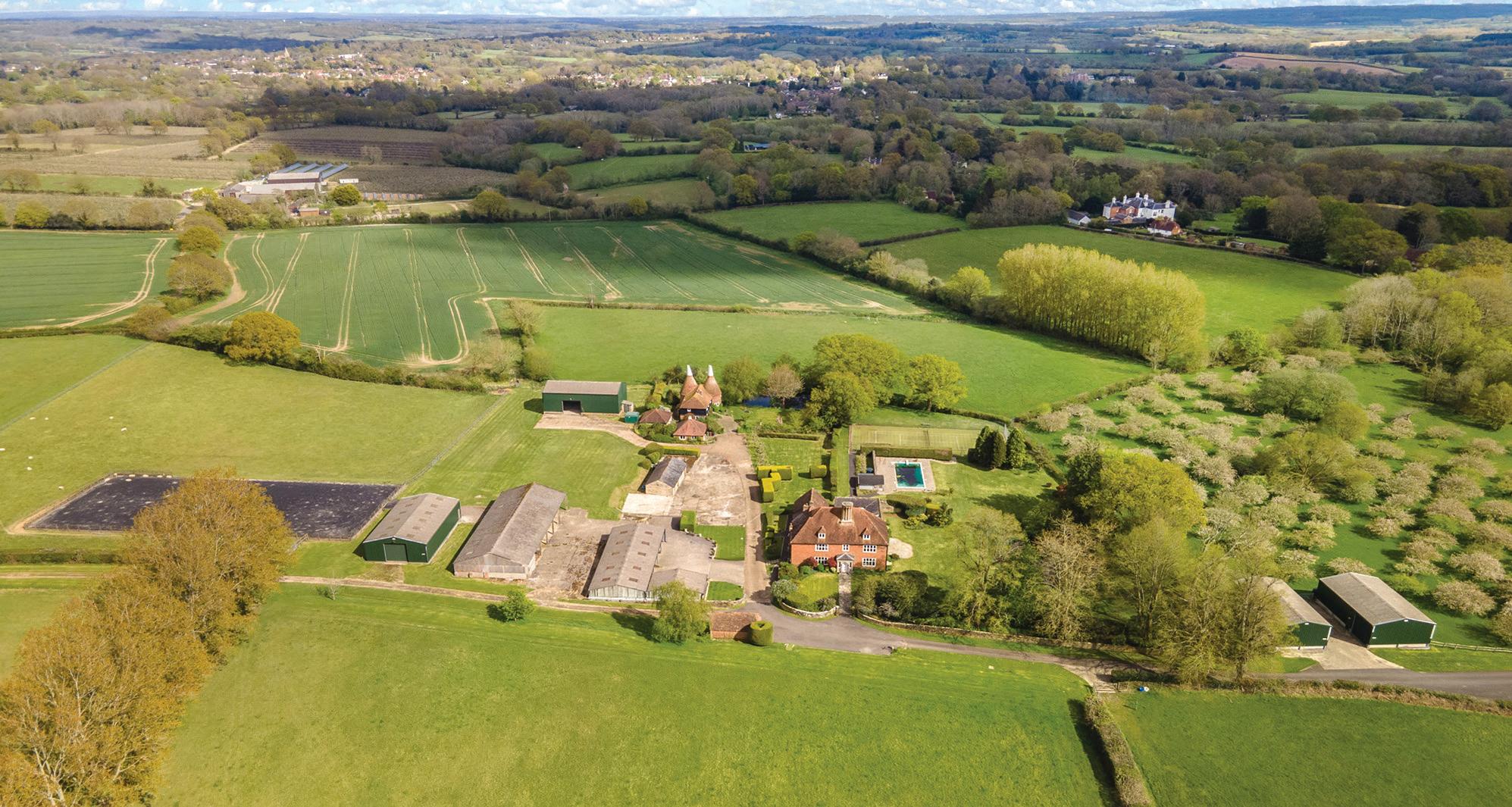
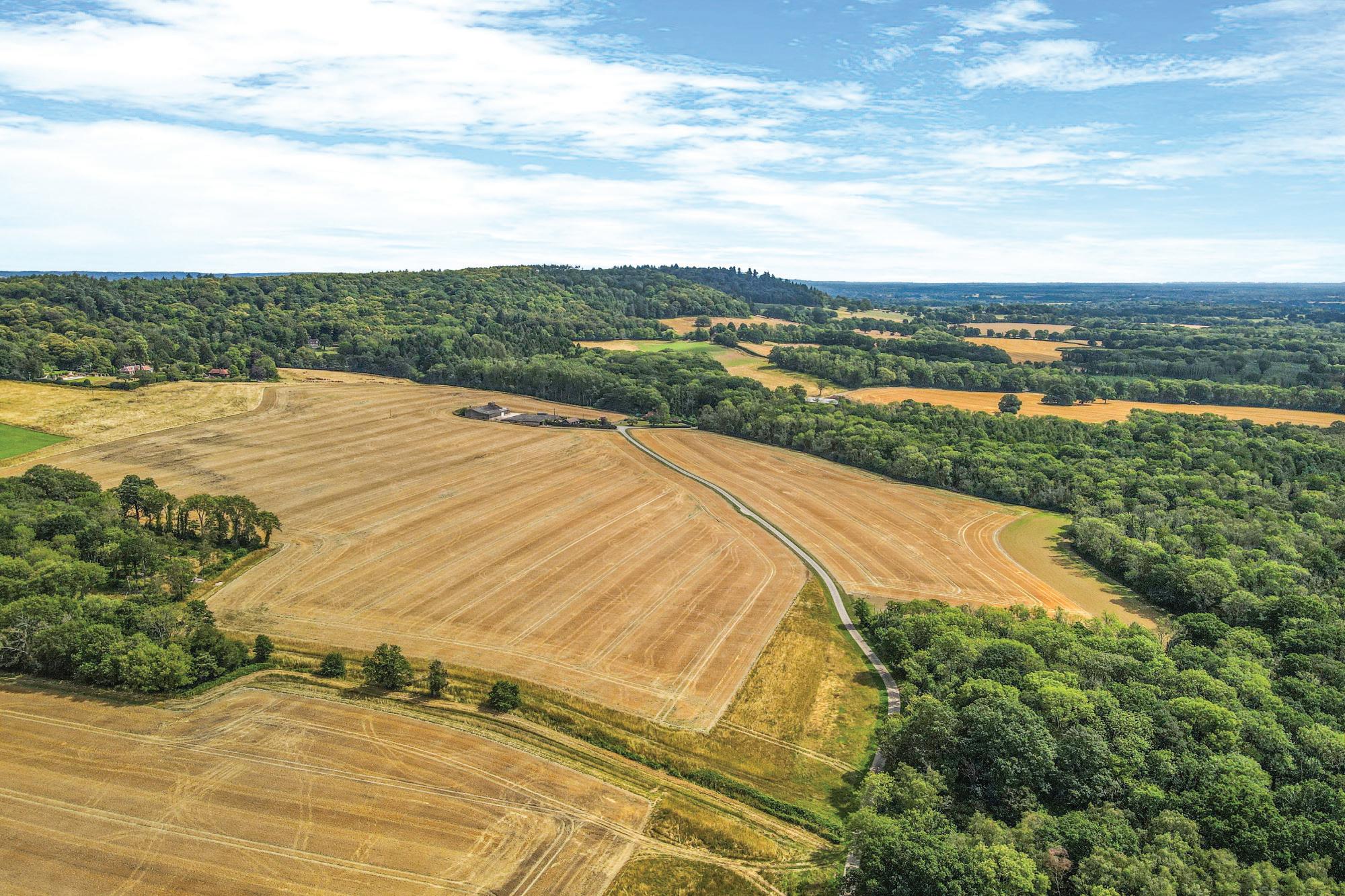





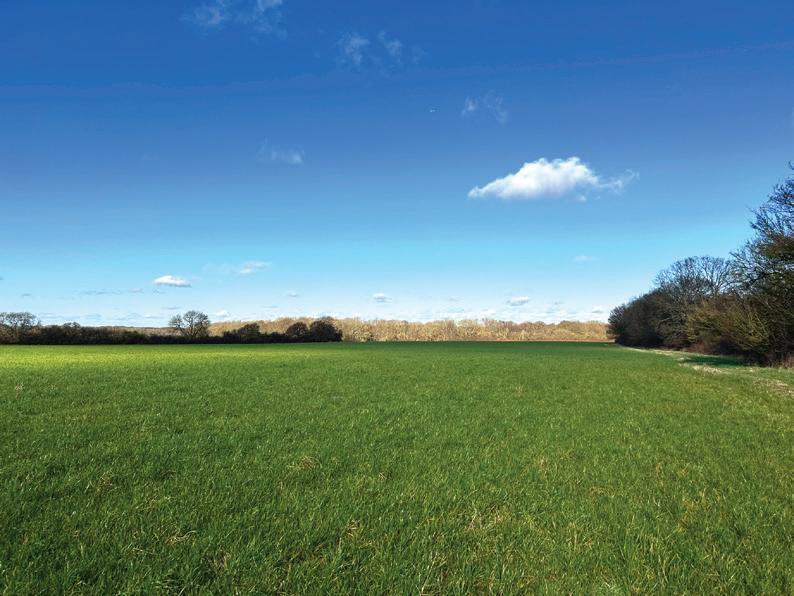



The Land at Newlands Farm provides a rare opportunity to purchase approximately 57 acres of Grade 3 arable land in an accessible location within the M25 through Batcheller Monkhouse. The land is available as a whole or in two lots.

The land at Newlands Farm is in an attractive location surrounded largely by open farmland and woodland. Farleigh Golf Club is adjacent to the property on the western boundary. The property is close to the villages of Warlingham and New Addington and is located within the Metropolitan Green Belt. Biggin Hill Airport is within five miles of the property. For those with equestrian aspirations there is a network of country lanes and ample bridleways nearby.
The land is located on Farleigh Court Road approximately 2.4 miles from the centre of Warlingham, and comprises approximately 57.06 acres of Grade 3 arable and woodland.
The woodland included within Lot 1 extends









to approximately 2.45 acres and is comprised of a mix of broadleaf species. The land is available as a whole or in two lots:

Lot 1 extends to 28.93 acres in total and comprises 26.49 acres of arable land and approximately 2.45 acres of mature broadleaf woodland. The purchaser will be required to contribute towards the cost of maintaining this access.
Please note that if the land is not sold as a whole, a sale will not be agreed on Lot 1 prior to a sale of Lot 2.
Lot 2 extends to 28.13 acres in total. The land is currently in temporary grass.
The land is currently in temporary grass. The previous years’ cropping is as below:


The previous years’ cropping is as below:
Crop 2019 OSR, Fallow
Naked Spring Oats


Winter Wheat, Temporary Grass
Winter Wheat, Temporary Grass

or


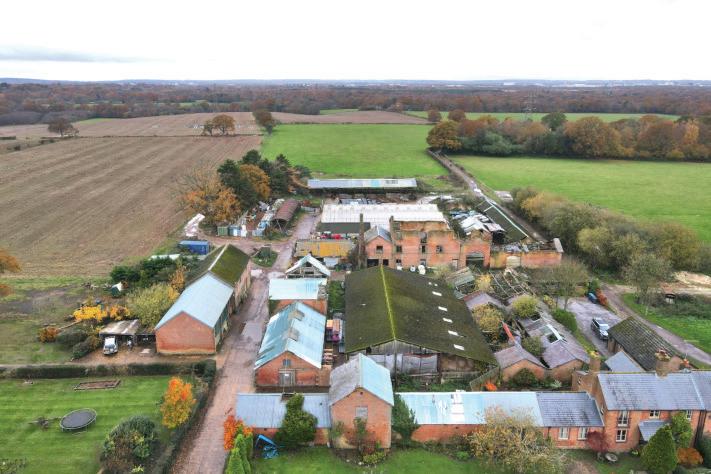

A ring-fenced arable farm with sporting potential in the Surrey Hills has come to the market through Savills.
Burgate Farm is a well-positioned farm of about 370 acres, with a mix of arable farmland and woodland, an attractive principal farmhouse, a three bedroom farmworker’s bungalow and a range of modern farm buildings.
The farm is let on a farm business tenancy until September 2027.
The farmhouse, which was originally two cottages, sits within a large garden and is positioned centrally among the extensive land, comprising 186 acres of Grade 3 farmland and 180 acres of woodland. The majority of the mixed coniferous and broadleaved woodland is designated as ancient and semi-natural woodland and offers great sporting potential. The farm enjoys fine and far reaching views.
It is situated between the popular villages of Dunsfold and Hambledon, with the larger town centres of Godalming, Guildford and Haslemere in close proximity.
Burgate Farm is being marketed by Savills for a guide price of £4m.





Long-awaited changes to a range of permitted development rights relating to agricultural buildings have brought new opportunities regarding Classes Q, R and A&B.
Class Q allows for the conversion of agricultural buildings to residential dwellings, Class R allows the change of use from agricultural to flexible commercial use and Classes A & B allow for the erection of new agricultural buildings.
The change grabbing the headlines in Class Q is the increase in floorspace that can be converted, which has gone from a maximum of 865m2 to 1,000m2. While the increase is minimal, the maximum number of dwellings that can be created has been doubled from five to 10.
The date of eligible agricultural buildings has also been reset, which means barns that existed before 24 July 2023 and were secured through the full planning process can now be converted, whereas previously only buildings in place before 2013 were eligible. Any barn secured through permitted development rights after 24 July 2013 will need to wait 10 years before becoming eligible.
As with anything to do with planning, there is always a flipside. One aspect that may cause some concern is the reduction in the maximum size of the dwellings that can be created. The maximum floorspace for a dwelling created under Class Q, previously 465m2, has now been reduced to just 150m2
Basic maths shows that to take advantage of the full 10 dwellings now allowed, each dwelling would be just 100m2. The good news is that until 20 May 2025, both sets of legislation will run concurrently, so to convert a barn into your dream family home, act now before the window closes.
There are concerns over how a further change will be implemented regarding rear extensions. Previously conversions were limited to the existing envelope of the building, but extensions of 4m over existing areas of
hardstanding off the rear wall of the building are now permissible.
The issue is determining what constitutes a rear wall within many agricultural buildings and this is likely to be a bone of contention with many councils. Additionally, while extensions are now possible, the maximum floor area remains at 1,000m2
These changes present opportunities in certain cases, especially on sites that have ‘maxed out’ their Class Q potential under the old legislation, but they have also removed the opportunity to create larger family dwellings. The changes have created further complexities around complying with the legislation, which means professional assistance from a planning consultant is more important than ever. One disappointment is that changes that would have allowed Class Q to be used in National Landscapes and on a wider selection of disused rural buildings have not been introduced.
The changes to this permitted development right are easier to understand and have added general industrial and outdoor sports and recreation to the list of permitted commercial uses, as well as doubling the allowable floor area for conversion from 500m2 to 1,000m2
Unfortunately, the permissible general industrial uses are restricted to the processing of raw materials, excluding livestock, which are produced and sold on the site, together with goods ancillary to the processing of those raw goods. While this limits the possible industrial uses, it would allow, for instance, farmers to make food or drink from their produce or manufacture furniture from timber produced on site. While any expansion in the possible
commercial uses of redundant agricultural buildings is welcomed, the prescribed nature of the permissible industrial processes is disappointing. It should be remembered, though, that Class R allows a range of commercial uses including shops, offices, cafés and restaurants and so the increase in allowable floor area is a positive change.
Most readers will be familiar with these classes, which are the principal way in which new agricultural buildings are erected. The upper limit for buildings within Class A, which applies to agricultural unts in excess of five hectares, has been raised to 1,500m2, and the limit for Class B (less than five hectares) to 1,250m2. These rights can no longer be used in the curtilage of a scheduled monument. Farmers and growers are urged to think carefully now about their building needs and take advantage of these rights while they still exist.
While these permitted development updates have been marketed by government as meaningful changes designed to tackle the rural housing and economic crisis, and appear on the surface to be a step in the right direction, even the most cursory look at the details suggests a different story.
These changes are complicated, purposely obtuse and don’t perhaps improve things as much as might appear on first reading, but don’t be put off; there is much within these regulations to allow you to grow your business and diversify, although we would still urge government to relax the provisions to better support a struggling farming sector.
For expert advice, the Batcheller Monkhouse Planning Team is happy to help.
NICK WEBB PlannerT: 01892 509280
E: n.webb@batchellermonkhouse.com








Just to the south east of Haslemere and within the South Downs National Park, a glorious block of ancient woodland and permanent pasture in West Sussex, extending to 66 acres, has been brought to the market by RH & RW Clutton.
The block is offered in three lots. Lot 1 comprises almost 48 acres with 22 acres of pasture and 26 acres of mixed broadleaf woodland with a little pocket of Tsuga. On the edge of the woodland lies a large, partly
collapsed steel frame building. Lot 2 offers 12 acres of mixed woodland with streams and Lot 3 is a sheltered, six-acre paddock.
James Tillard commented:”Crossed by only one footpath, the block offers enormous sporting potential and the opportunity to bring the woodland back in hand commercially with a new woodland management plan.”
A guide price for the whole of £585,000 has been quoted.
Further details are available from RH & RW Clutton on 01342 305825 or 01798 344554.






Land at Newlands Farm
Farleigh Court Lane, Nr Warlingham, Surrey
Approximately 28 acres of bare Grade 3 arable. Currently in temporary grass. Vacant possession available immediately.
The land will be sold subject to an Overage and Restrictive Covenants, please contact the agent for more information. Viewings strictly by appointment only.
Guide Price: £315,000

Emer Edwards MRICS 01892 509280 e.edwards@batchellermonkhouse.com



Kent | Smarden Offers in excess of £3,700,000
A rare ring-fenced Wealden farm offering total privacy with planning consent for residential development at its centre
Smarden: 1.7 miles, Pluckley Station: 4.8 miles (London Bridge from 45 minutes), Ashford International Station: 9.1 miles, Gatwick Airport: 55.8 miles, Central London: 55.3 miles
A 5-bedroom farmhouse with an agricultural occupancy condition | A collection of modern and traditional farm buildings with planning permission for residential development Grassland | Woodland | Ponds
About 172 acres (69 ha) in total
Available as a whole or in two lots
Liza Howden 020 7591 2214 liza.howden@struttandparker.com











A significant investment opportunity to acquire a let farm of almost 200 acres in West Sussex, has come to the market through Savills.
Home Farm is between Crawley, Crawley Down and Copthorne, within 7.2 miles of Gatwick Airport, close to the proposed Crabbet Park new village to the west and adjoining Copthorne Golf Club to the north.
The farmland extends to about 170 acres and is predominantly permanent pasture and
arable land, the majority of which is classified as Grade 3. There are also just over 15.5 acres of woodland, which forms the southernmost area of Kings Wood, an area of ancient woodland.
The agricultural buildings include steel framed buildings as well as a range of dilapidated traditional brick buildings, which are in need of significant restoration but have potential for alternative uses, subject to planning permission.
Home Farm is let under an Agricultural Holdings Act (AHA) tenancy.
Chris Spofforth, of Savills rural agency team in the South East, said: “The sale of Home Farm is a significant and exciting investment opportunity to purchase a 193-acre let farm with a range of buildings. Despite the semirural position, the farm is conveniently located within excellent reach of transport links.”
Home Farm is being marketed by Savills for a guide price of £1,250,000.
For more information, contact Savills rural agency team in the South East on 07812 965379 or 07967 555724



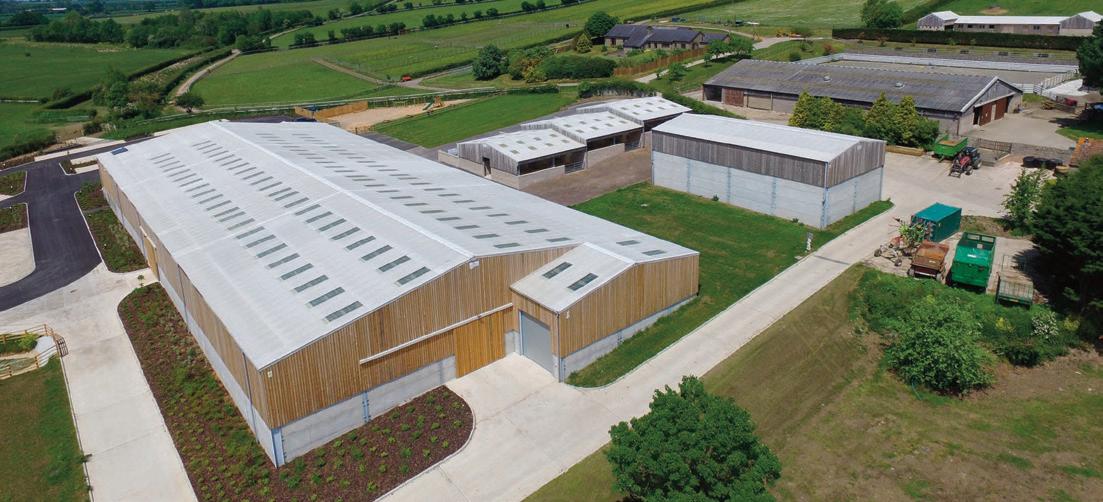






•






















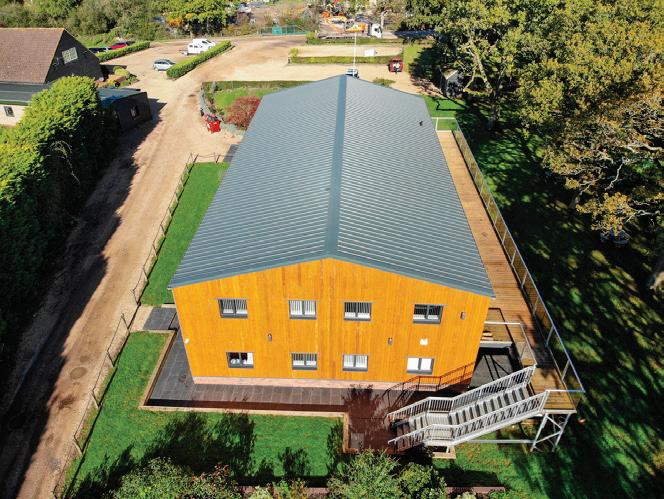














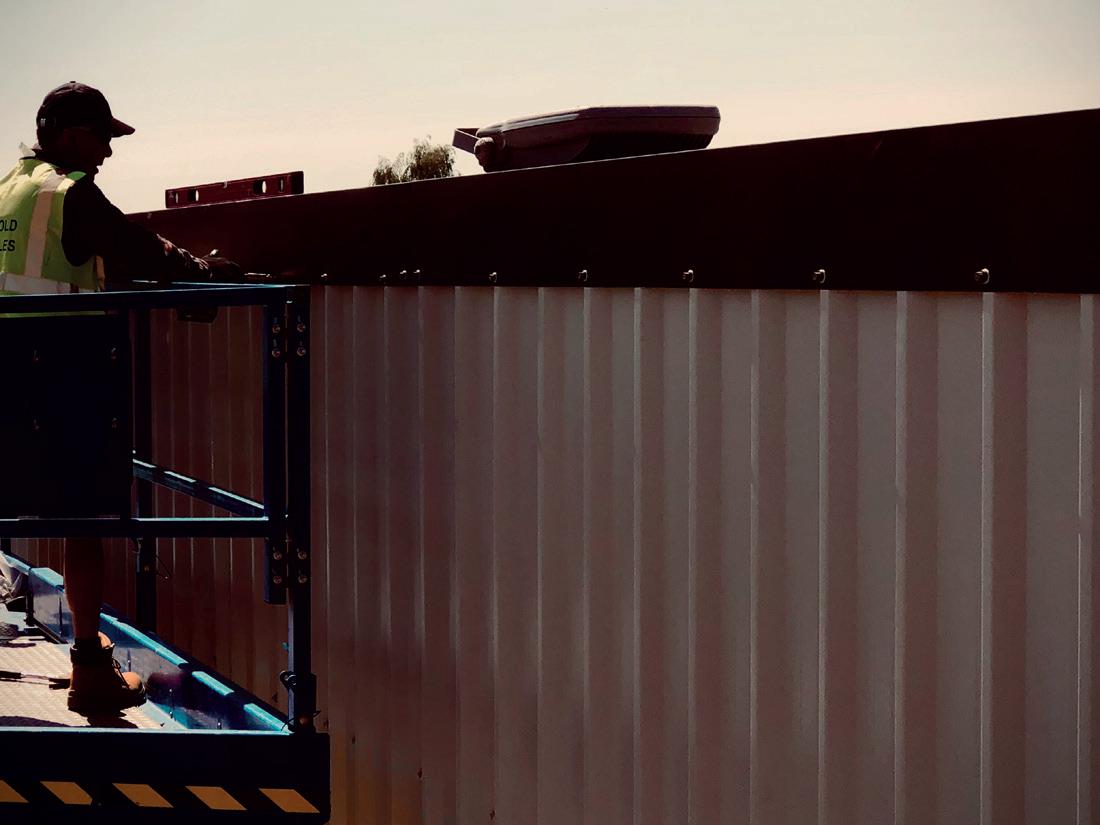














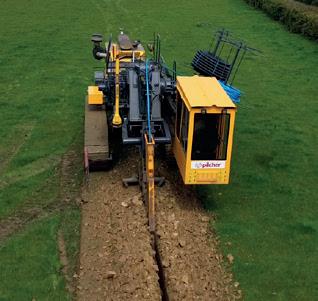

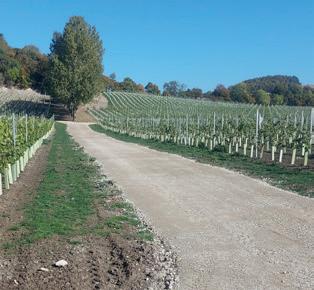






Cement - Insulated - Timber Boarding
Asbestos Sheet replacements - New Roof lights
New Roofs Projects & Insulated Over-SheetingValley Gutter repairs & Re-lining
Asbestos Stripping & Environmental Waste Disposal
Refurbishments & Extensions to existing buildings
Change of Use & Rental Unit Conversions
Insurance Claim Works for Fire, Flood & Storm Damage
Same Day - Next Day, Site Visit, Inspection Service
Making Building/Premises Safe - Secure
Emergency Clear-Up Operations
Asbestos Stripping & Environmental Waste Disposal
Demolition & Site Clearance Works
Ground Works, Roads, Drives & Drainage Works
Re-Instatement Works






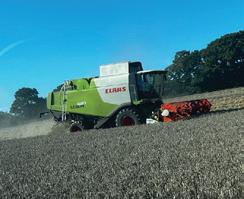










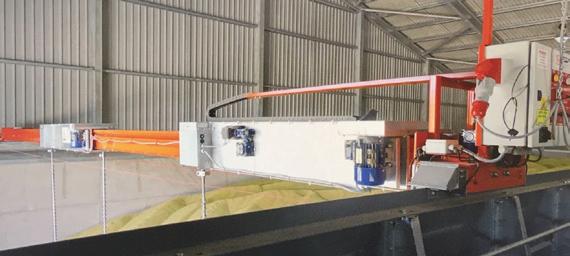






• Livestock fencing • Estate fencing
• Deer fencing
T: 01892 770186 E: enquiries@richards-fencing.co.uk W: richards-fencing.co.uk
Post and Rail
• Equestrian • Gates
• Bespoke bridges • Ground clearance
We are
Livestock fencing Estate fencing Deer fencing


Bespoke bridges





Ground clearance We are based between Crowborough and Tunbridge Wells on the Kent and East Sussex border.







































ACROSS
1 Herb (5,4)
5 Illegally hunt (5)
8 Insect (6,3)
9 Plant cultivated for flavour and medicine (5)
11 Ballet dancer’s skirt (4)
12 Quality measurement in fresh produce (7)
13 Queen album (1,3,2,3,5)
15 Exertion (6)
17 Quarrel (5)
19 Astronomical event (7)
22 Alpaca newborn (4)
24 Material falling down mountain [usually snow] (9)
25 Flying Scotsman; Mallard (5,5)
26 Horse feed (4)
DOWN
1 Franz ----- (5)
2 Damp (5)
3 Invalid (4)
4 Immediate environment (7)
6 ----- stream, tributary to River Wey, Hampshire (5)
7 Waterfall (7)
10 Male parent of bull (4)
13 Written statement used in court (9)
14 Capital of Latvia (4)
16 Number (3)
17 Supermarket rows (5)
18 Make a mistake (3)
20 Captivating quality (5)
21 Bring upon yourself (5)
22 Dairy product (5)
23 Edible root (6)
To enter, simply unscramble the anagram (11) using the green squares.



















LAST MONTH’S ANSWERS:


To celebrate Father’s Day we are offering readers the chance to win two Biddies 8, four Biddies 5, one Special Reserve and one Special Mead. For more information about the vineyards, please visit www.biddendenvineyards.com or call 01580 291726.
*Subject to availability


